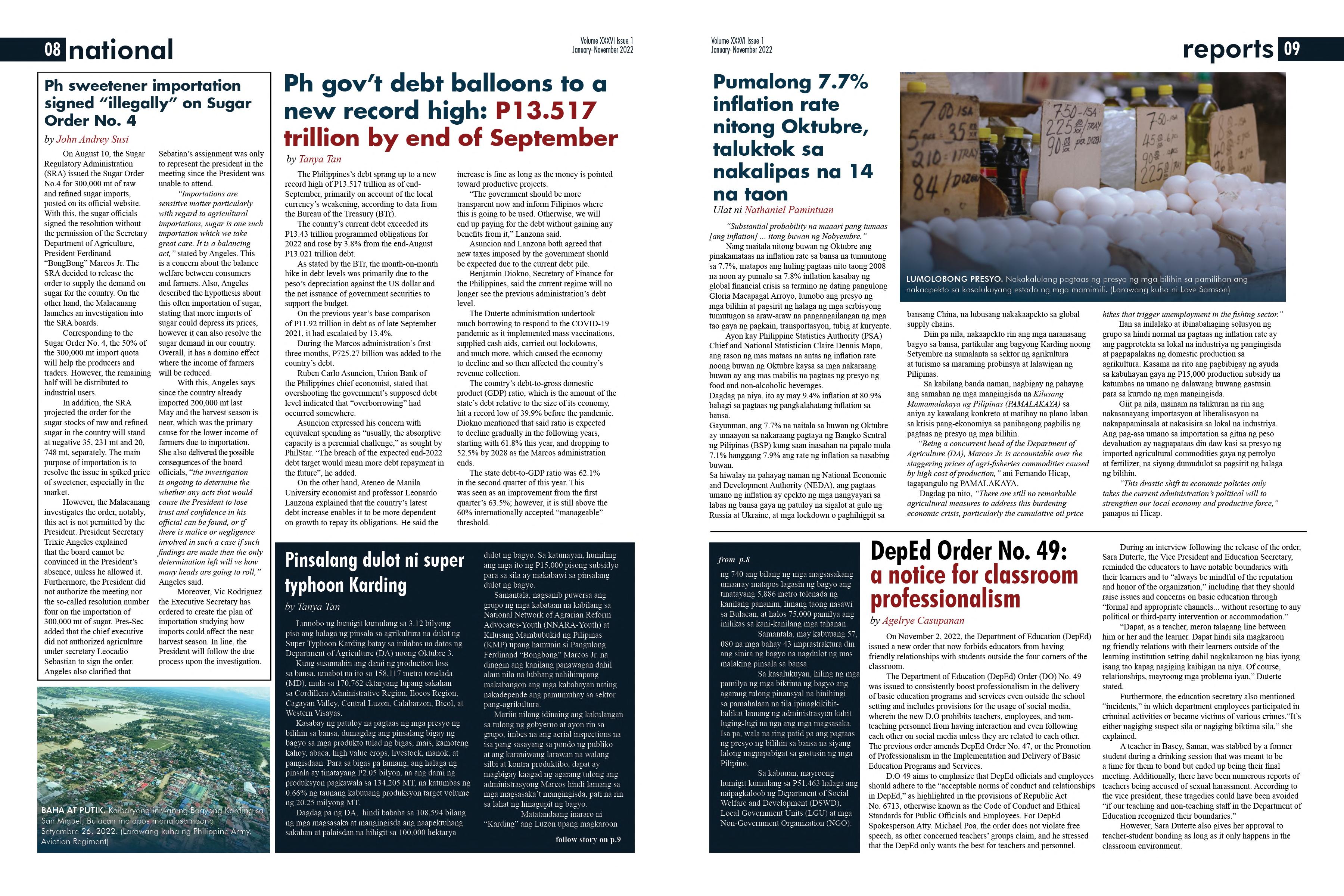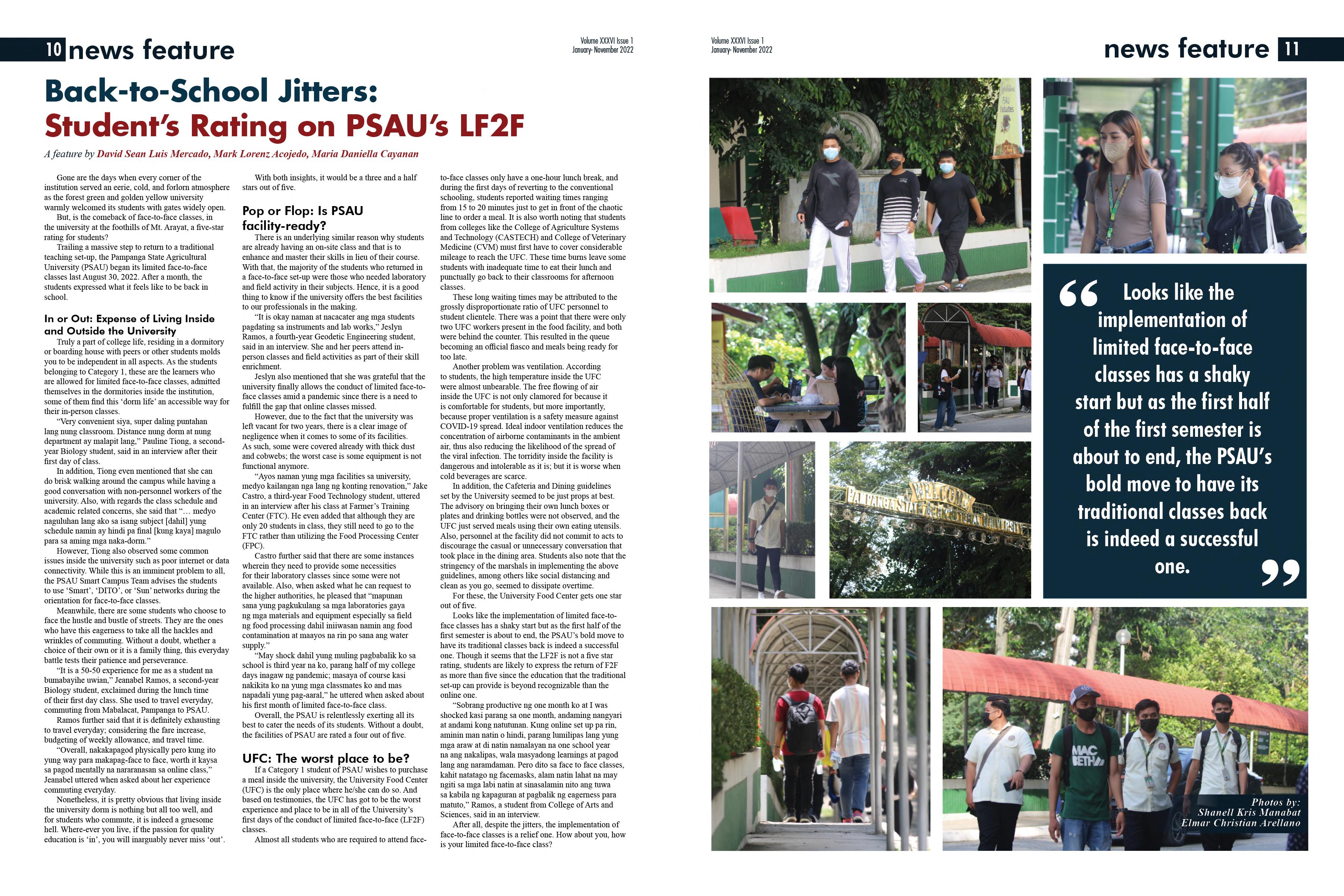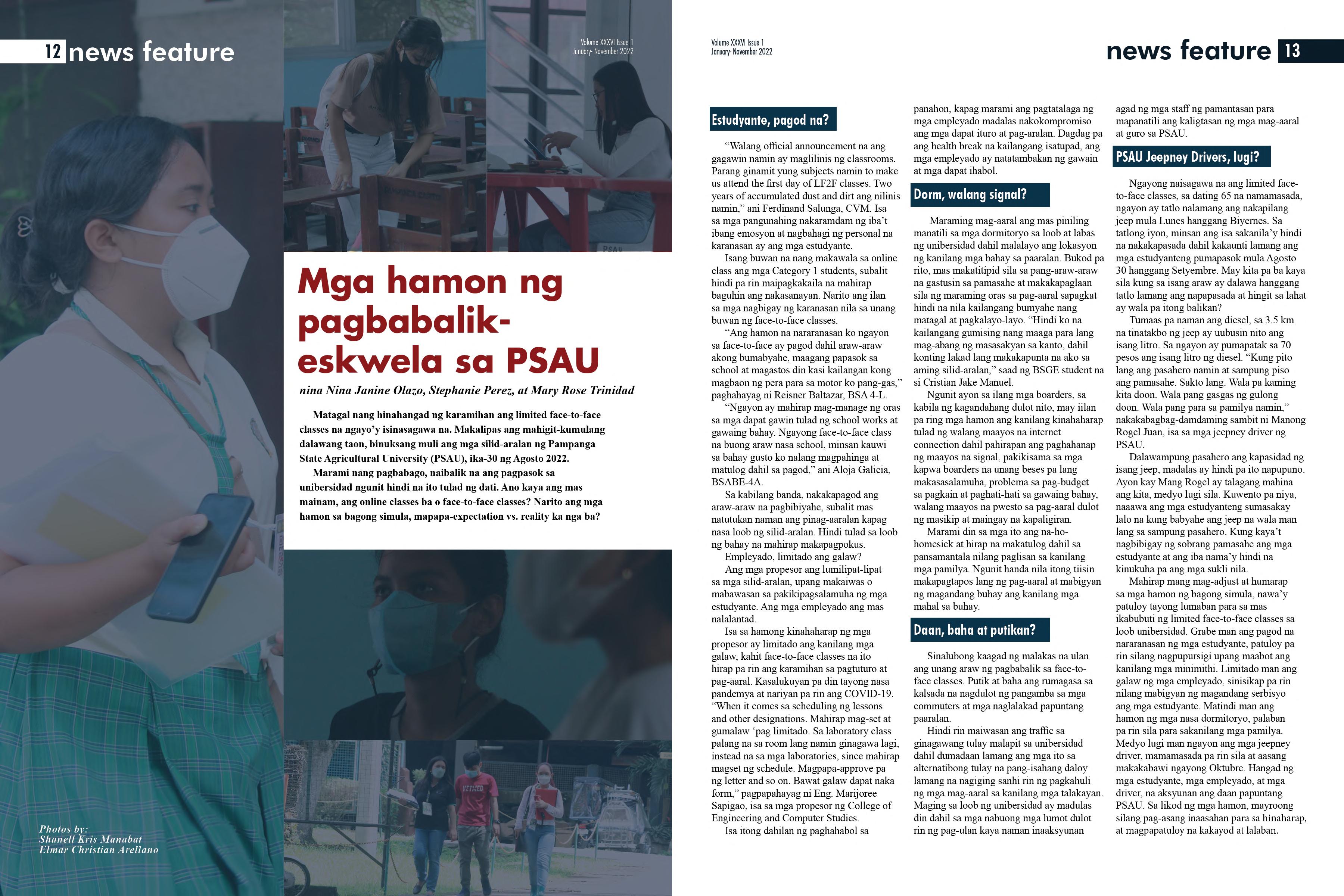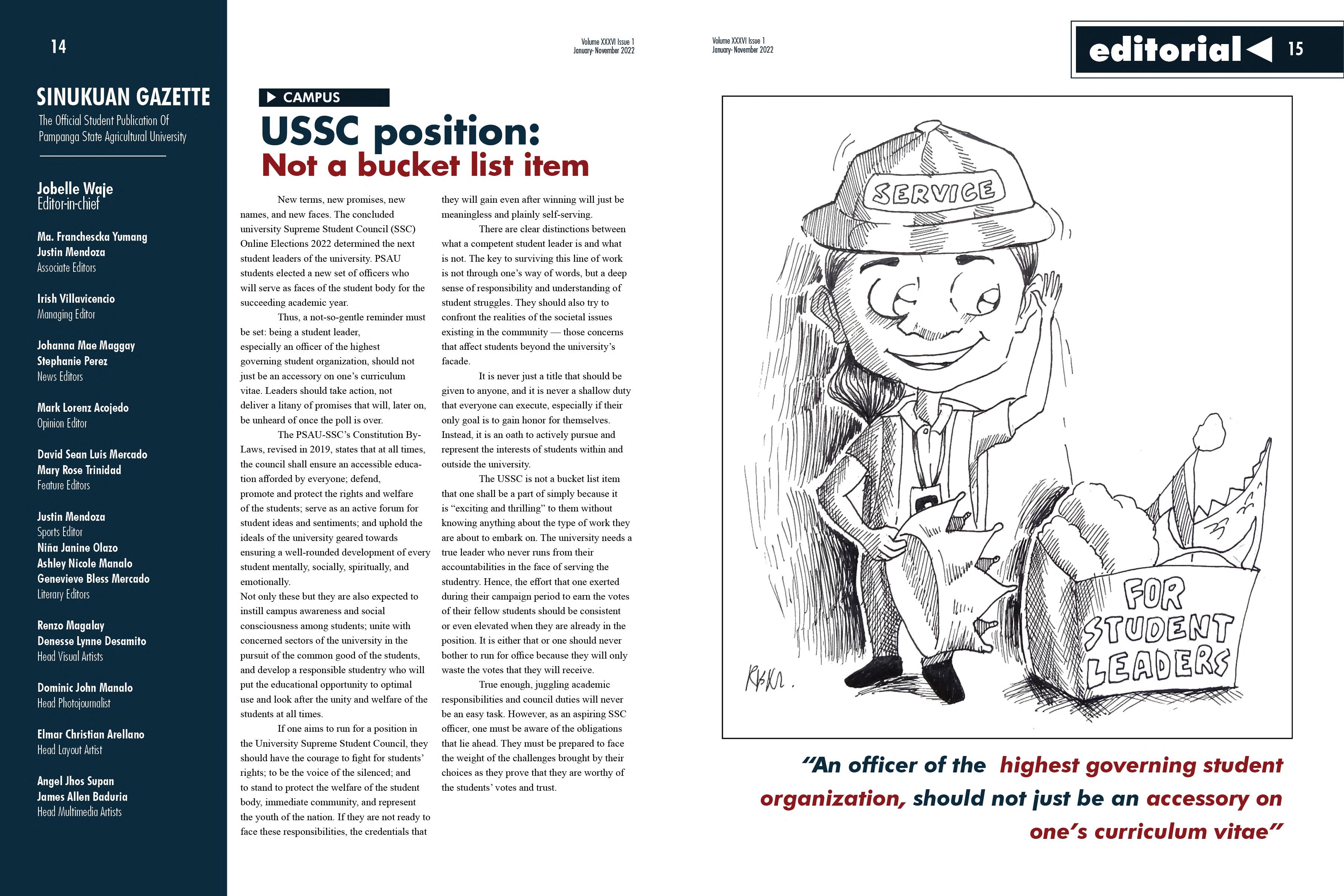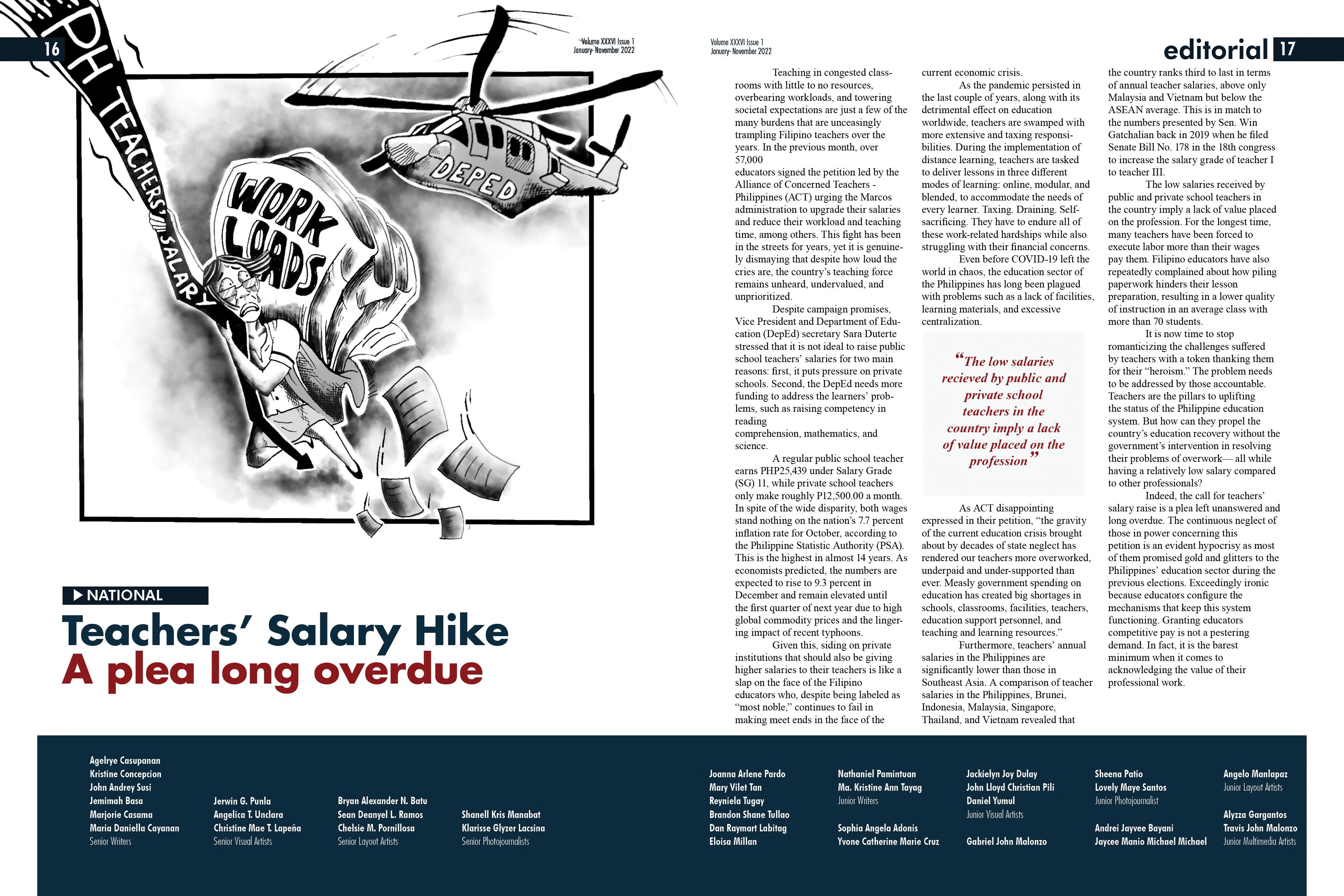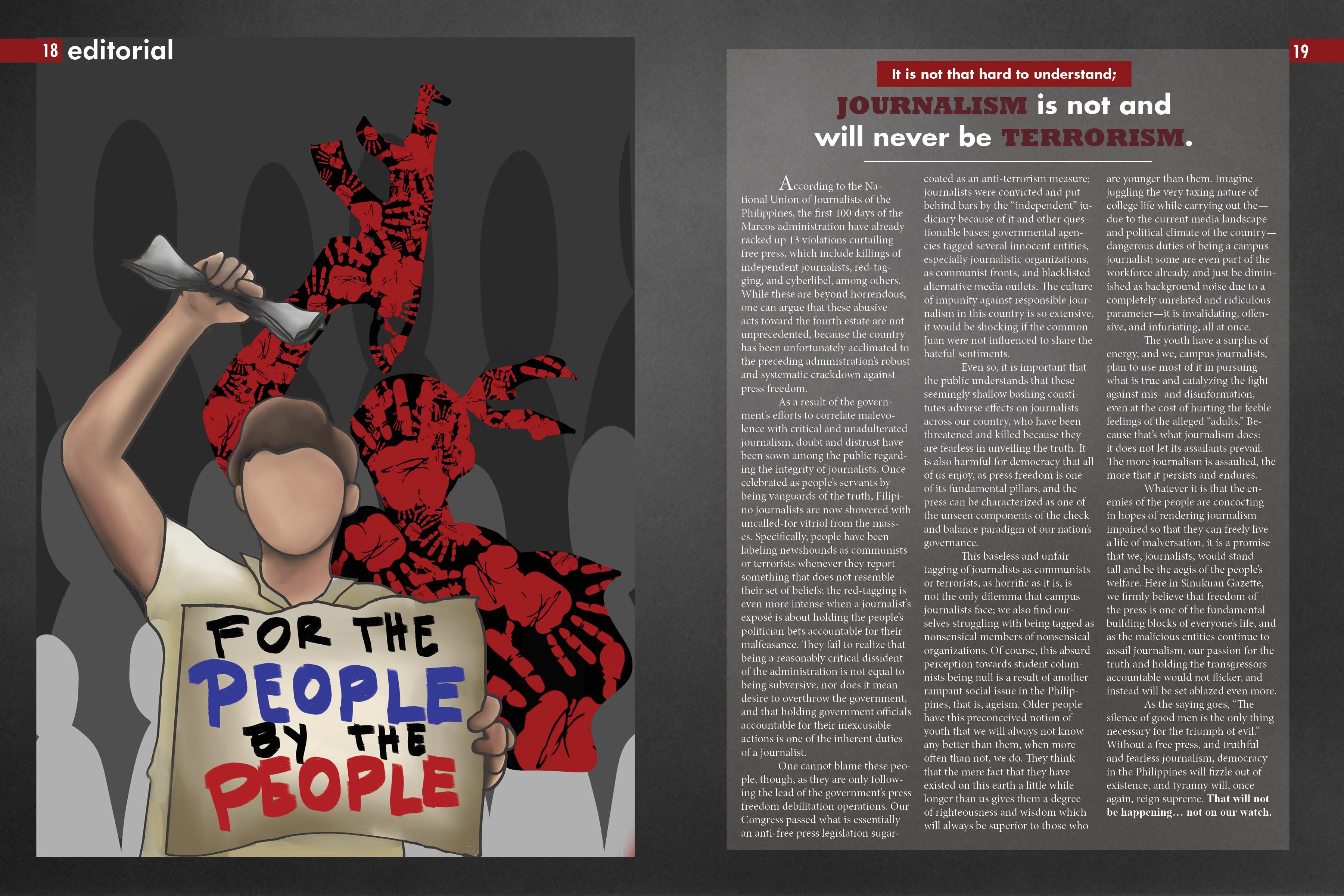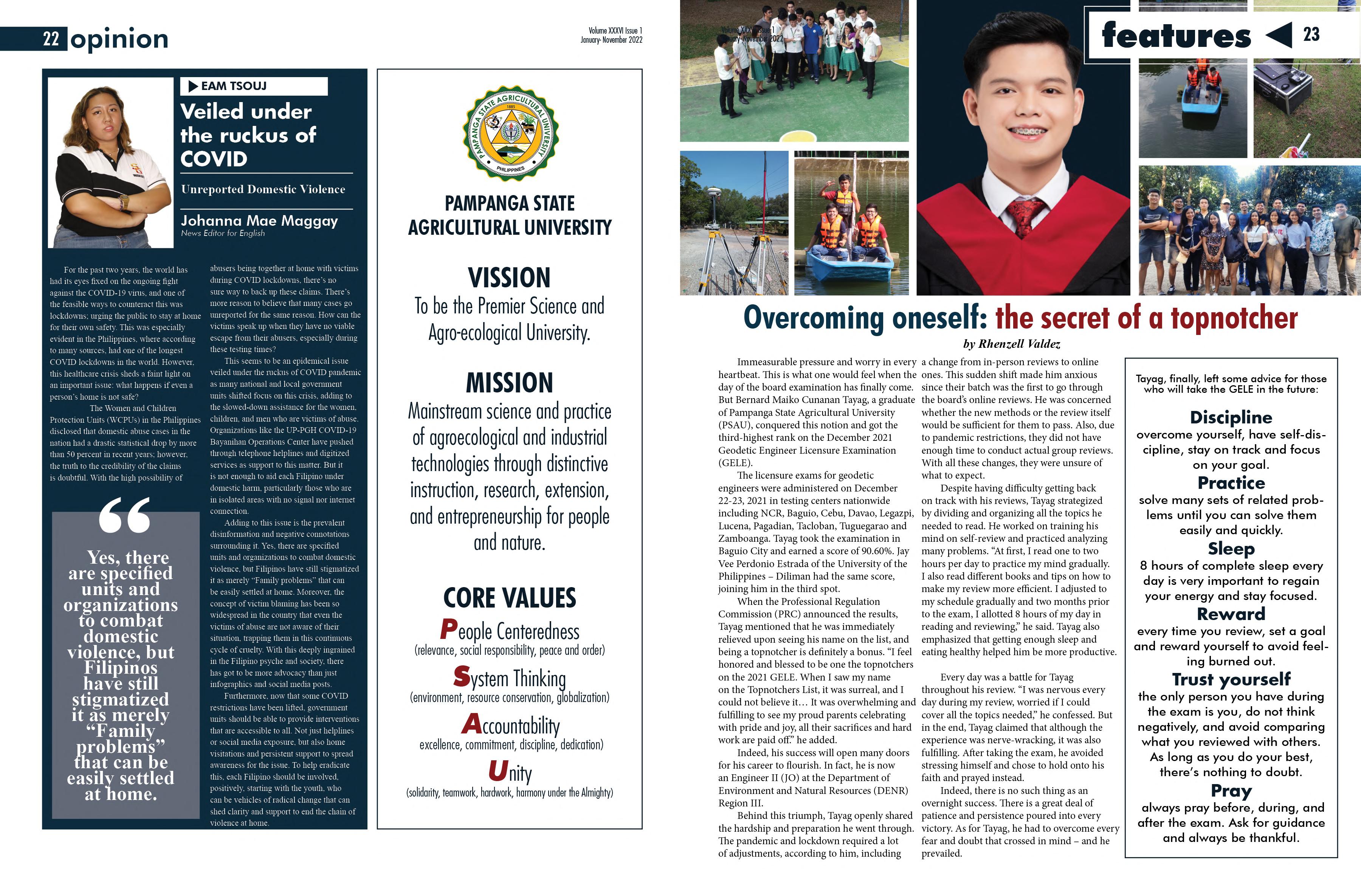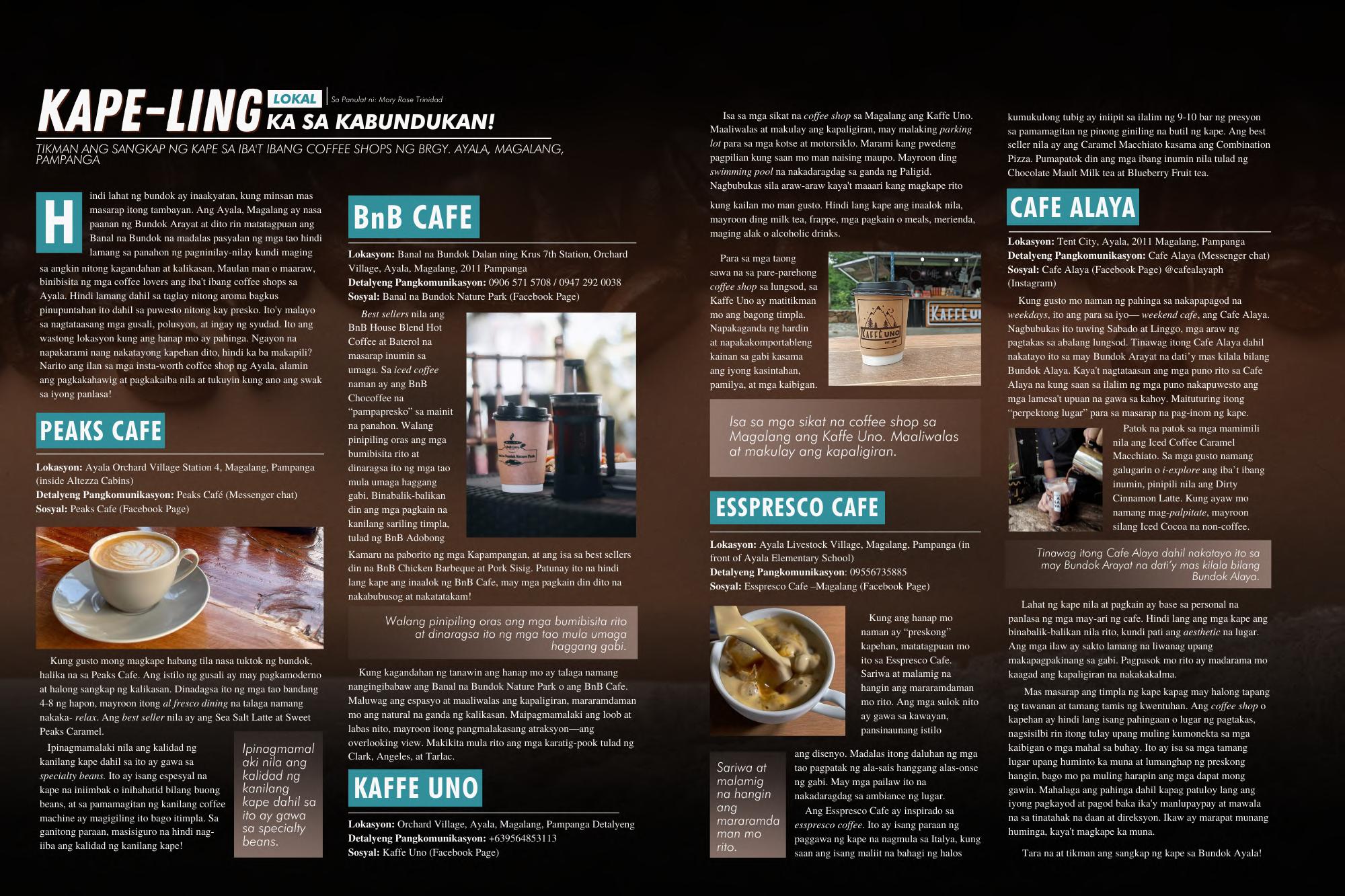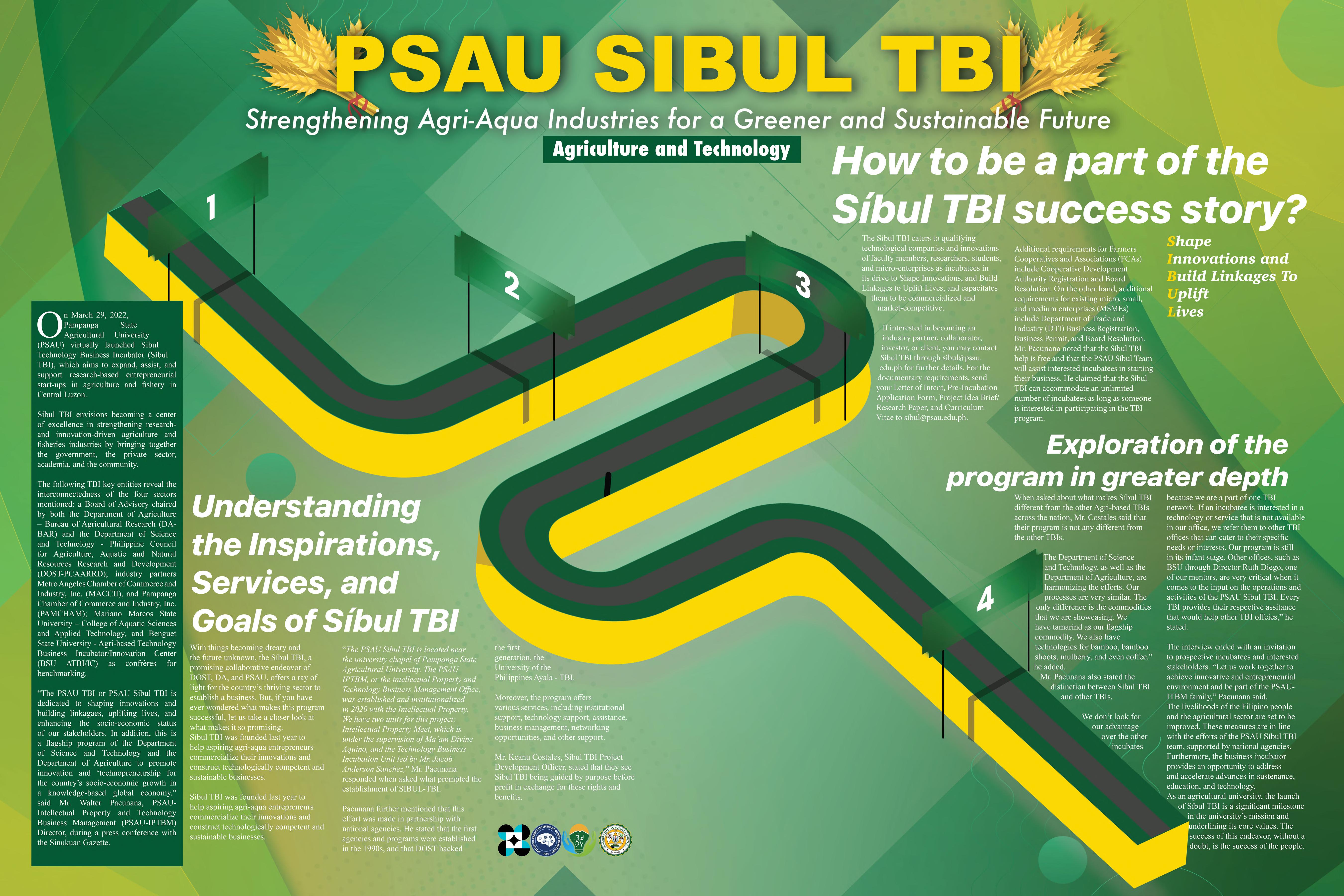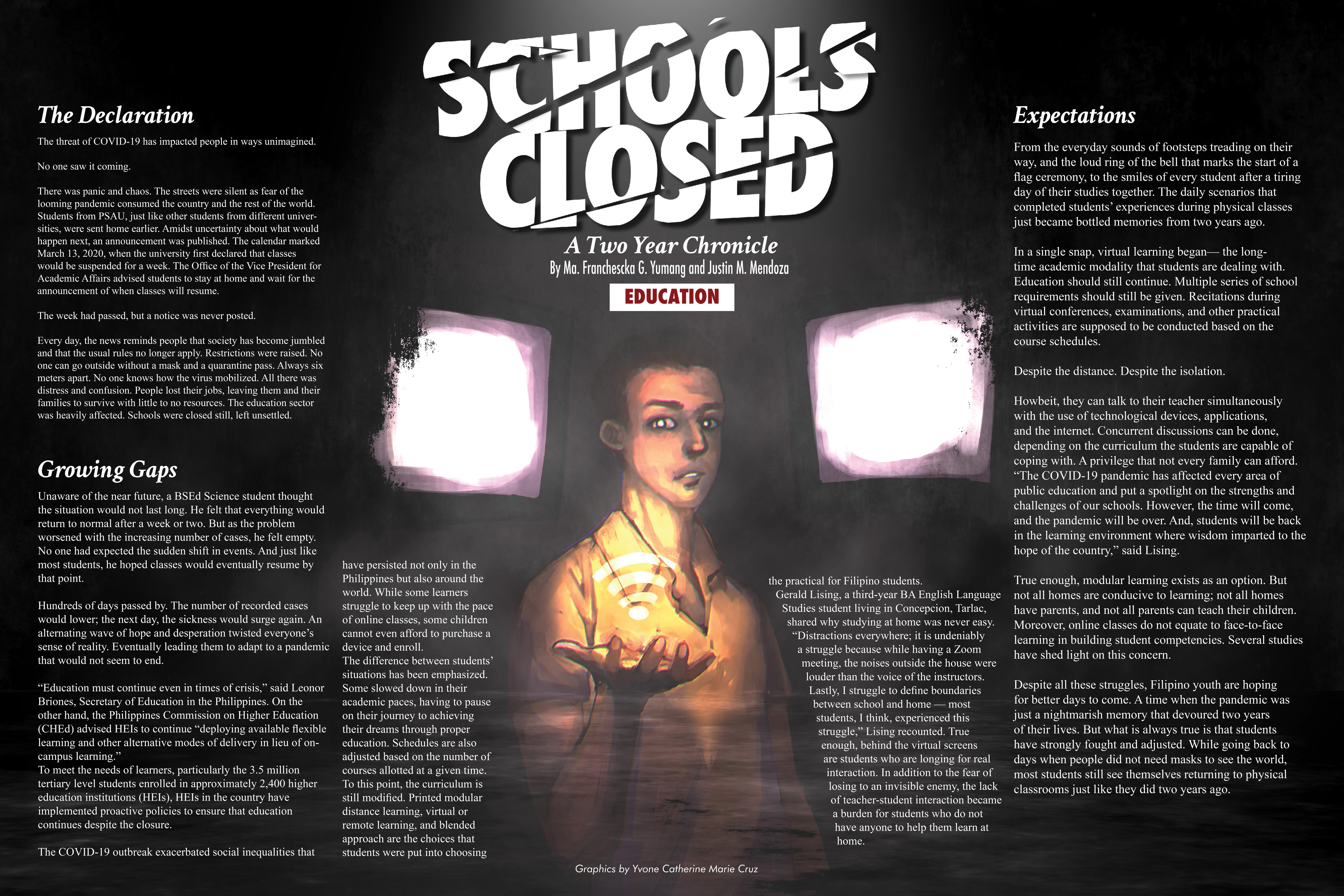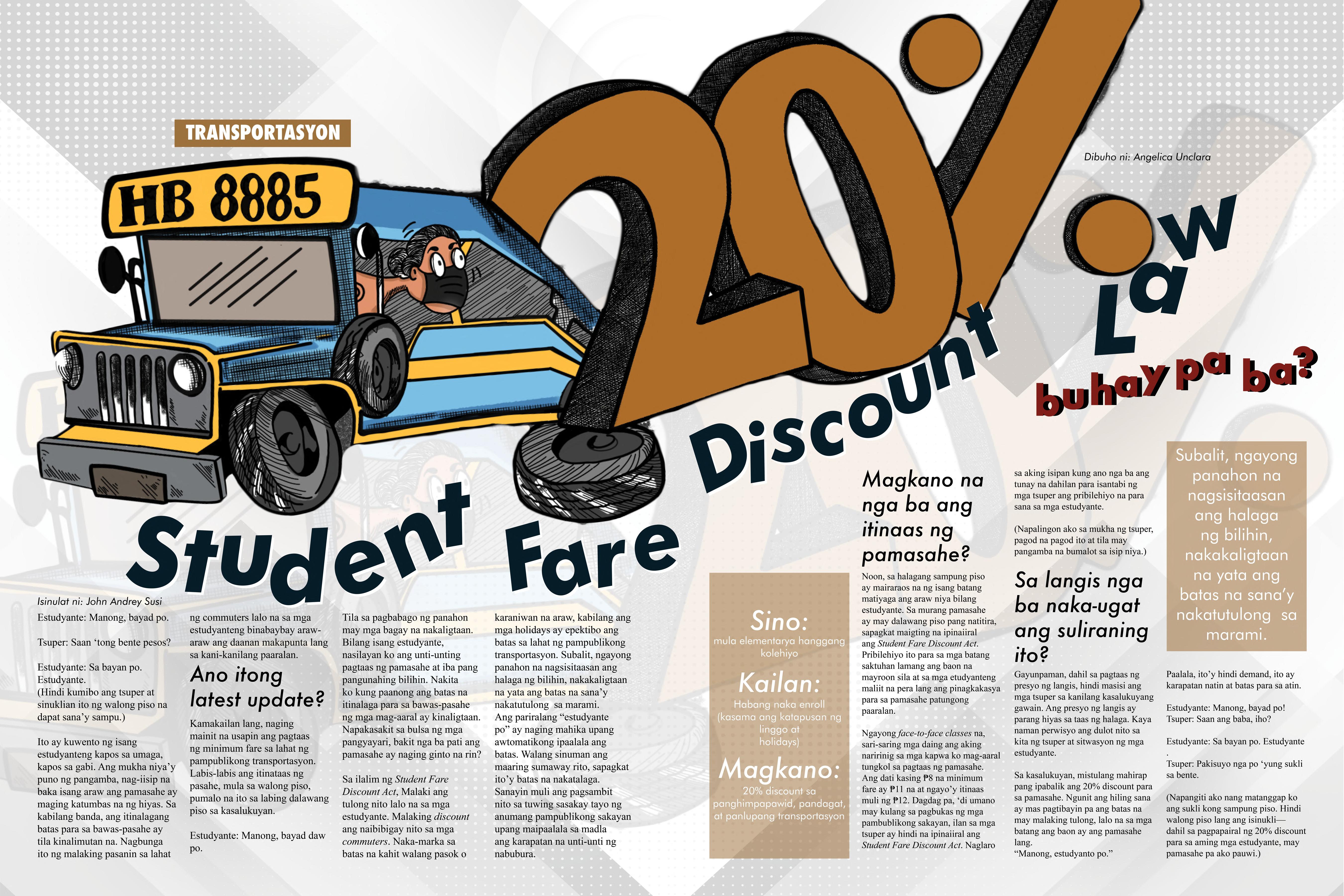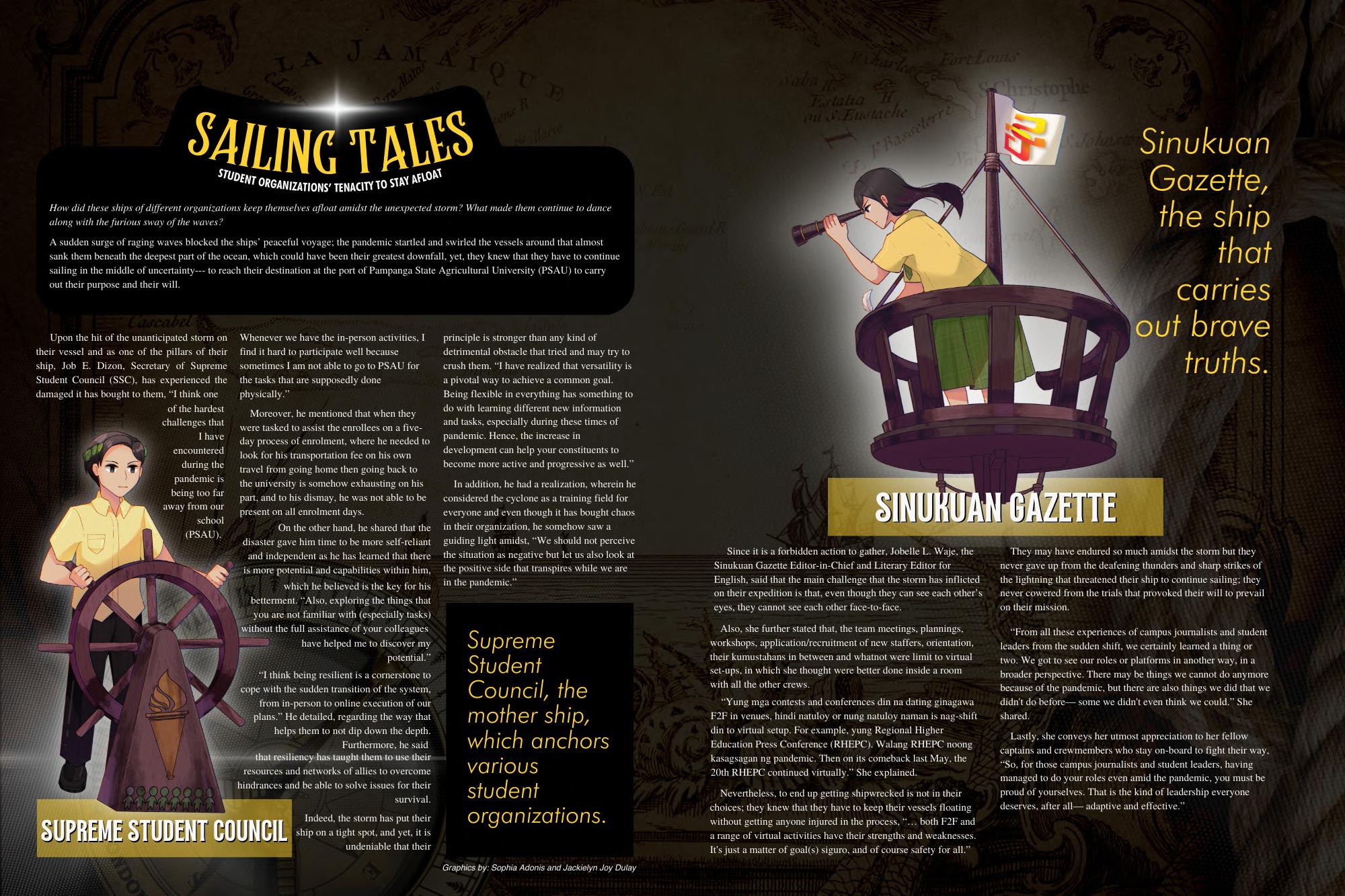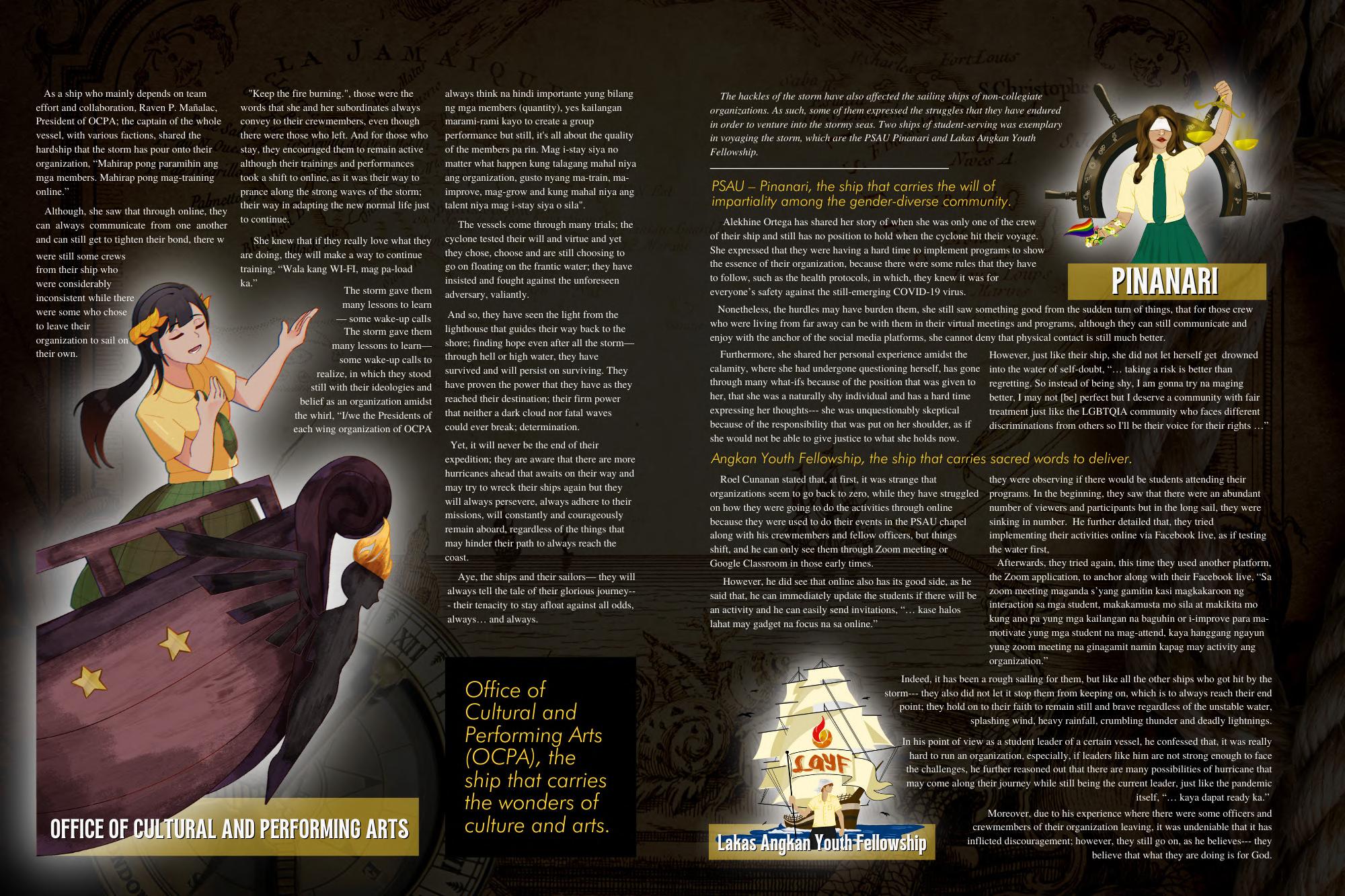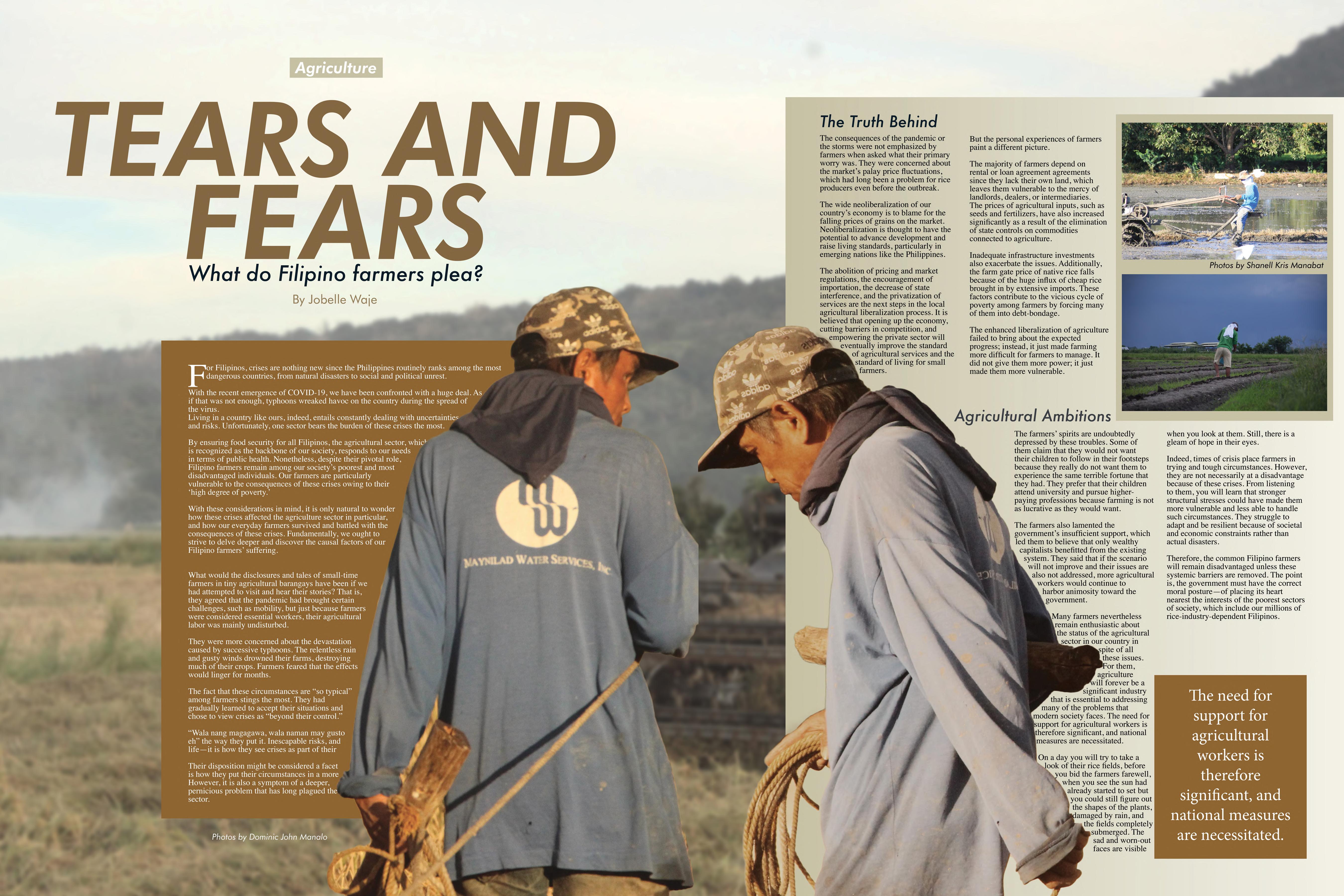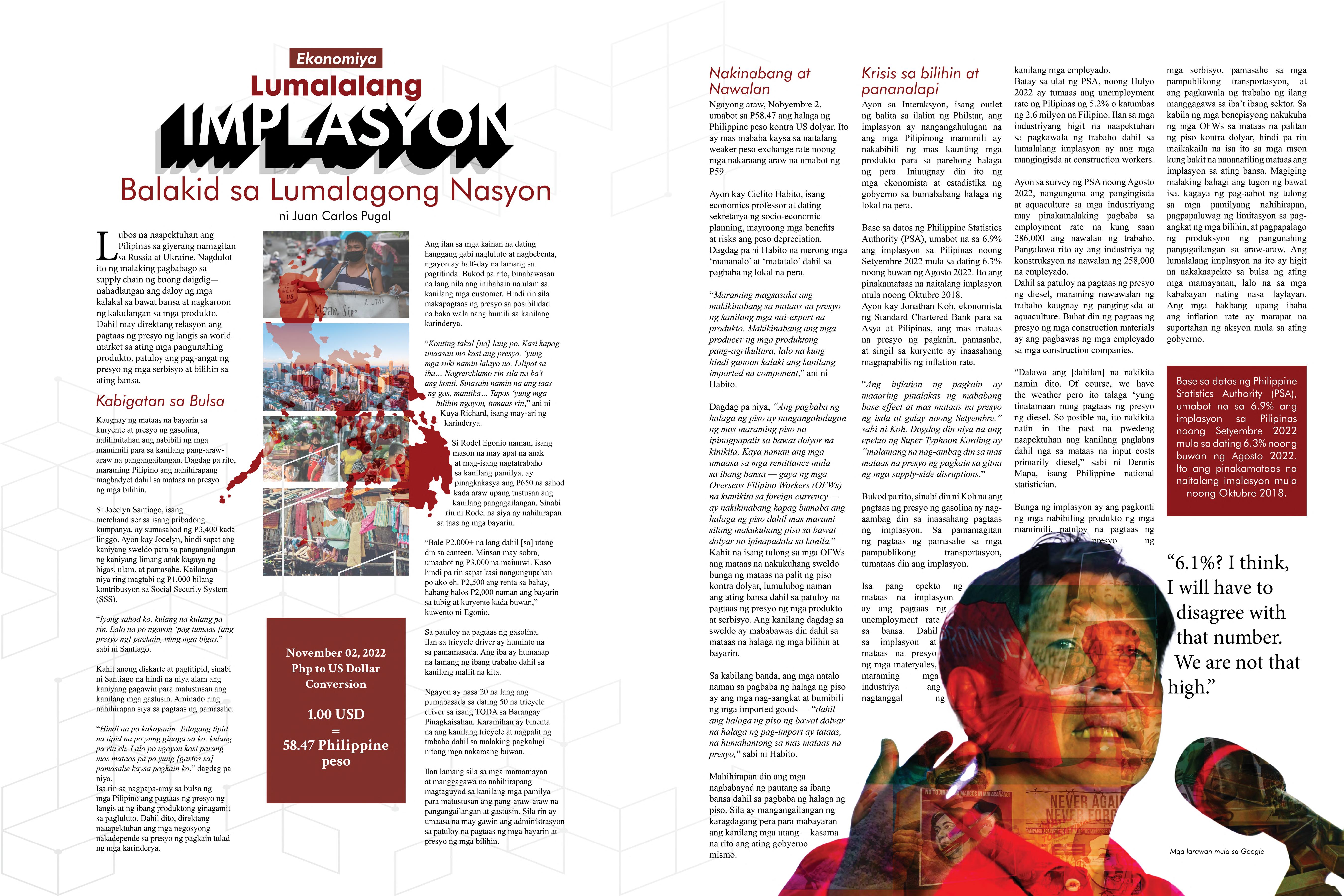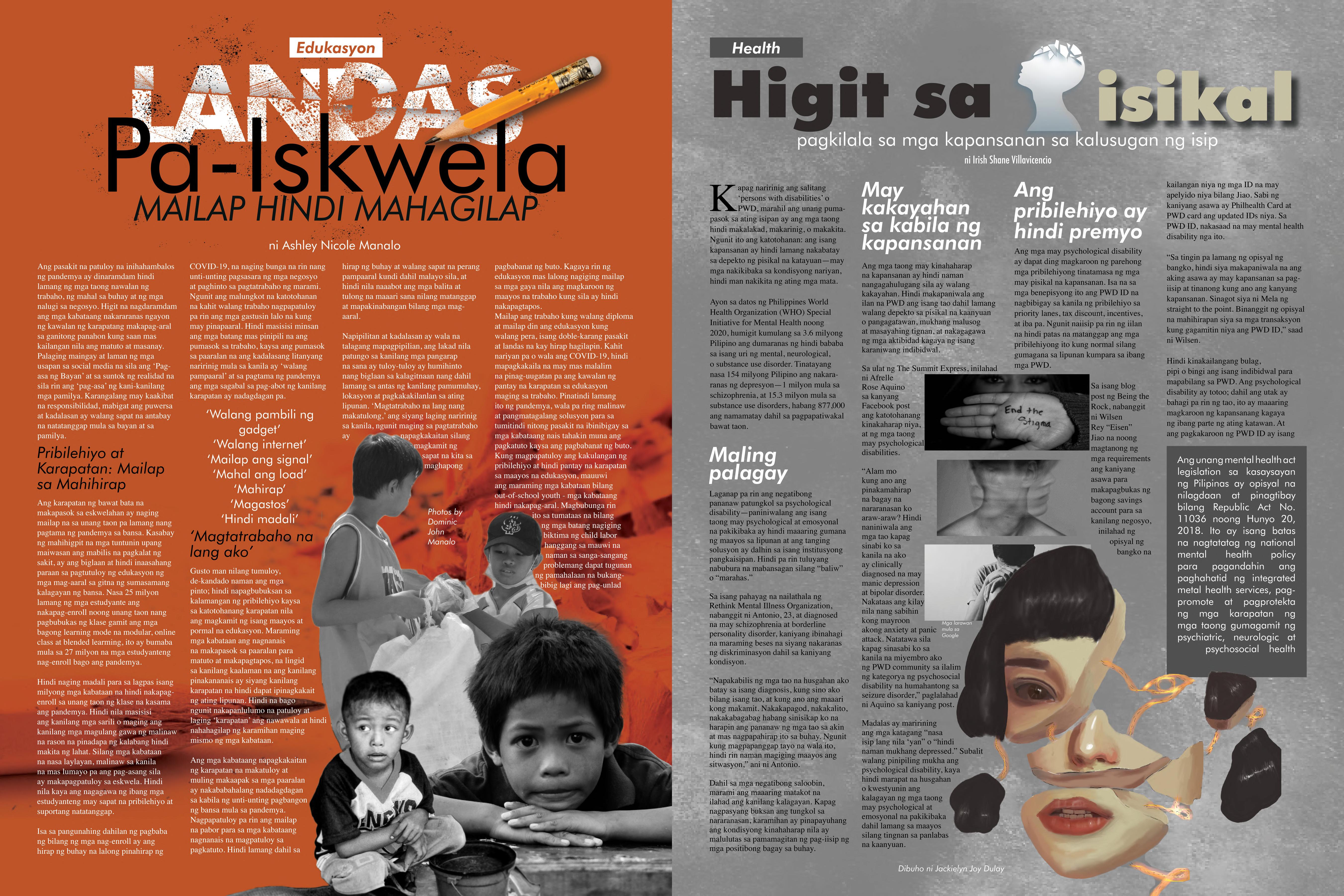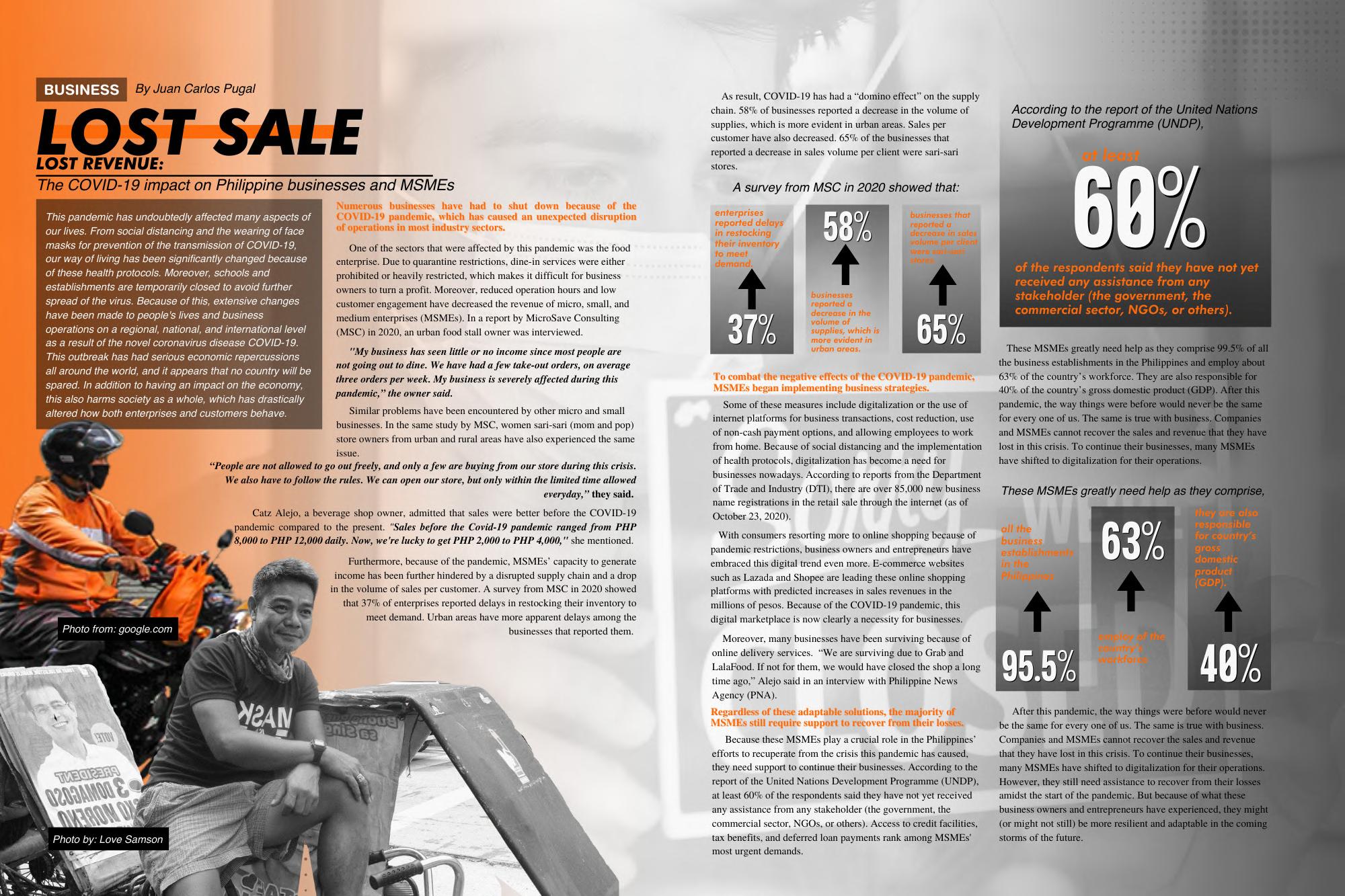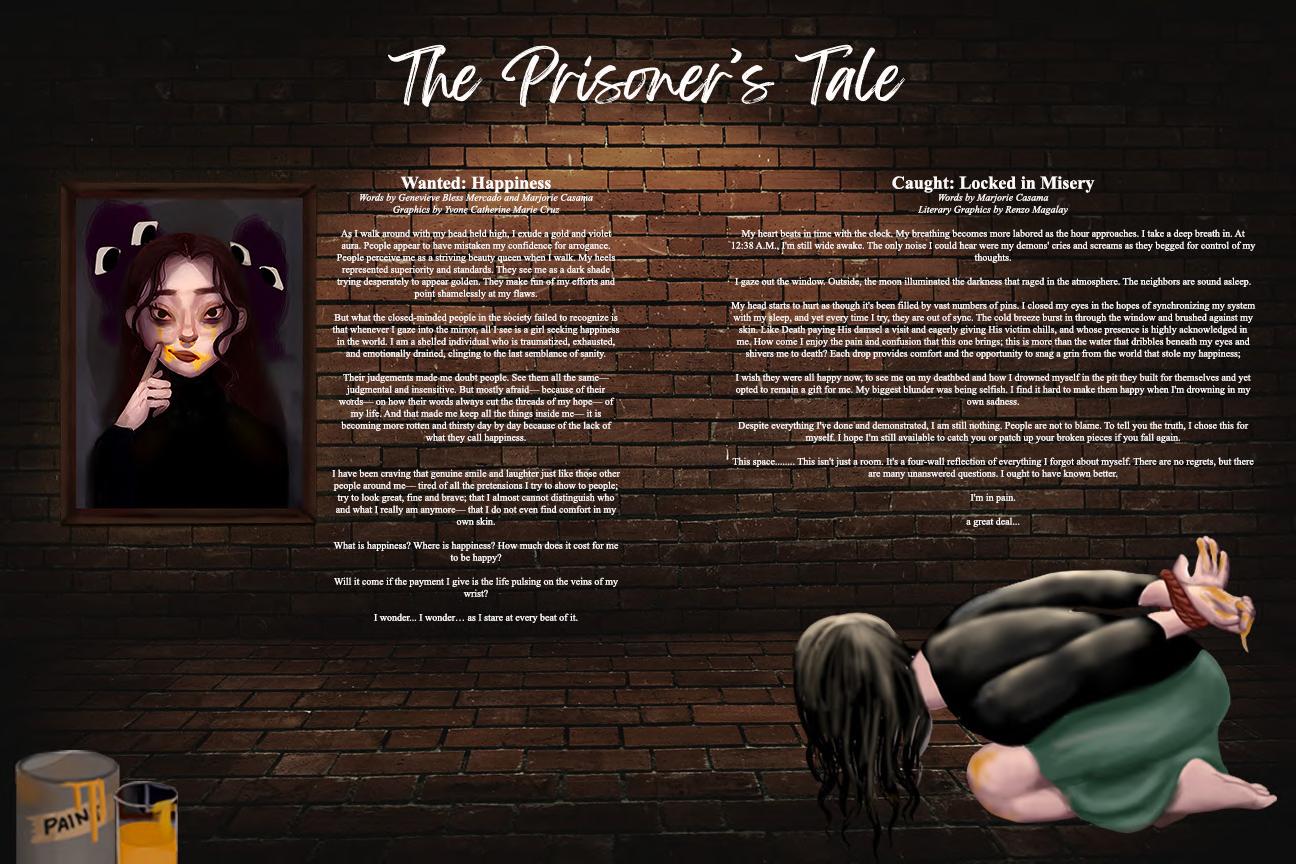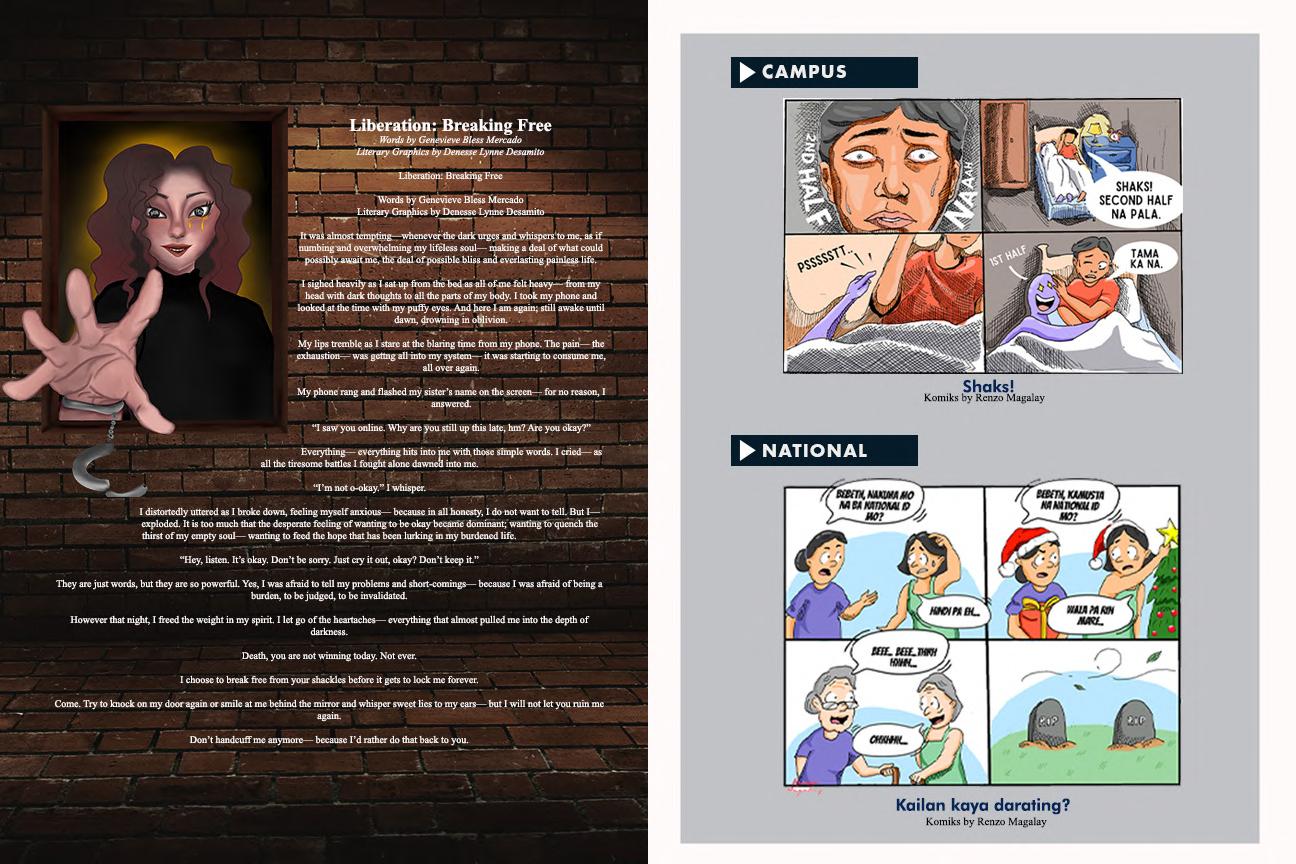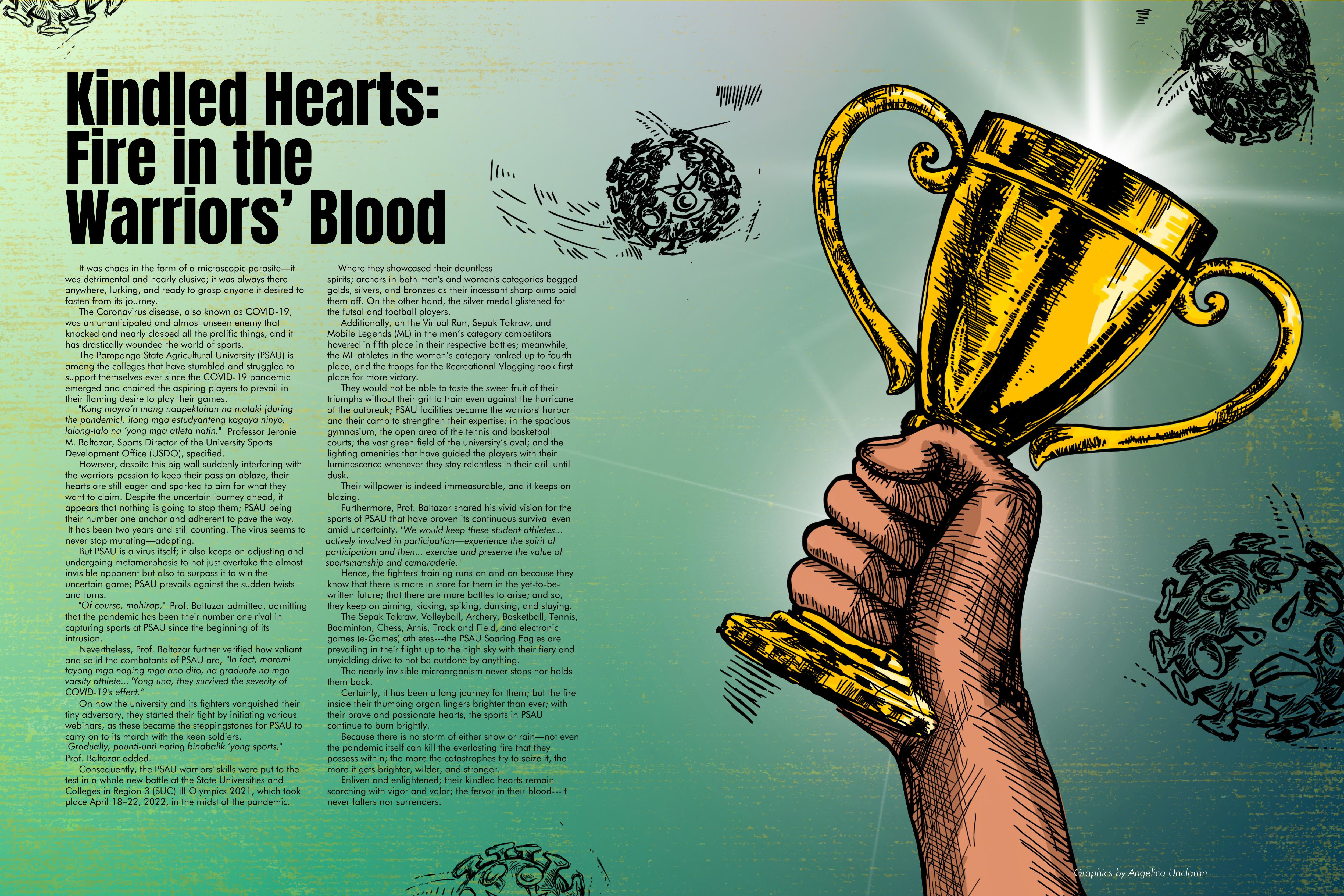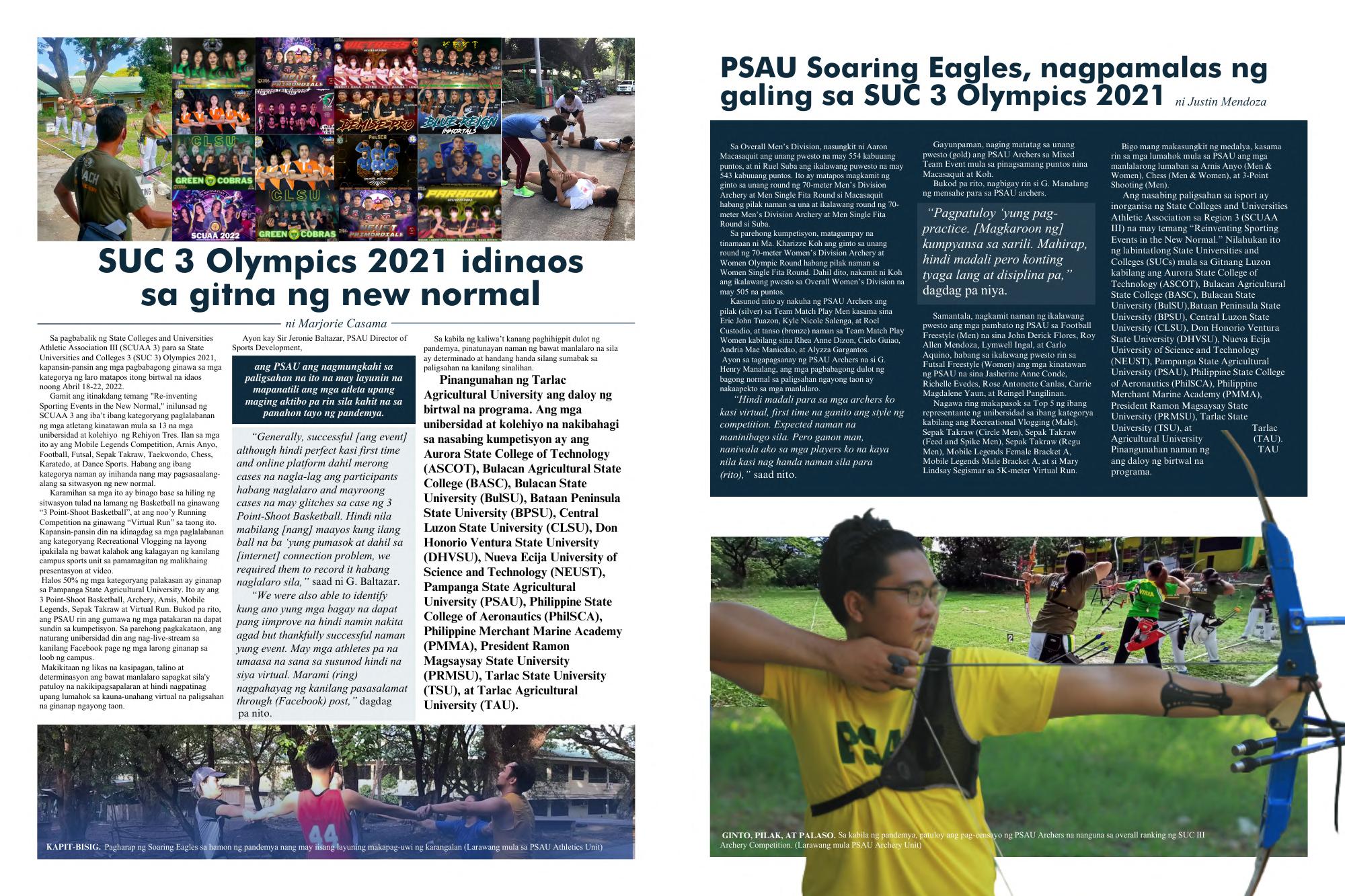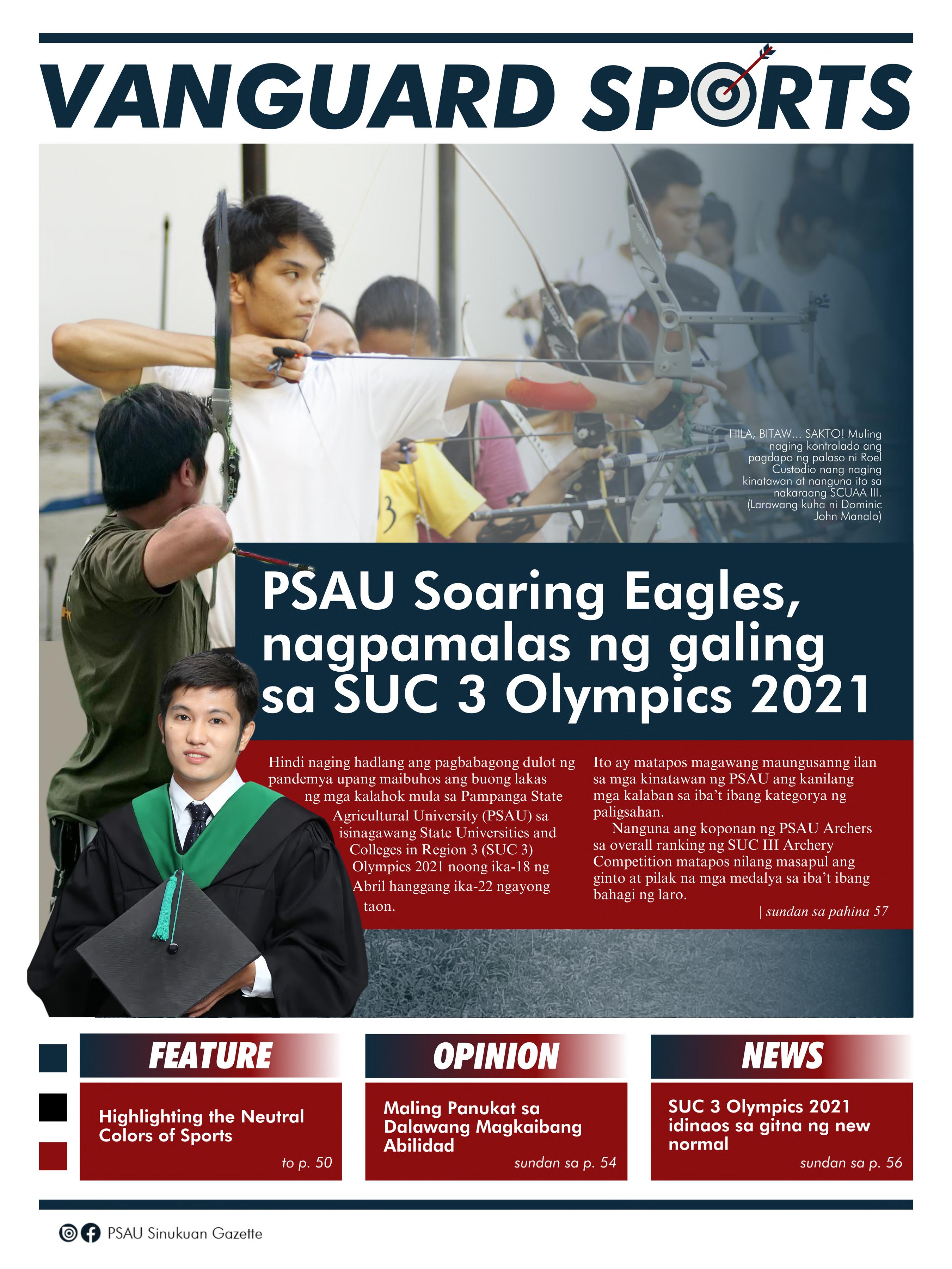




The Pampanga State Agricultural University (PSAU) - Future Mentors’ Organization organized a pinning ceremony for the fourth-year students from the different programs of the College of Education (CoEd). A total of 128 student interns took part in the momentous ceremony held on September 16, 2022, via Zoom and Facebook Live.
Associate Professor Jennifer T. Gamboa, Chair of the Bachelor of Elementary Education, officially opened the send-off for future educators. She talked about the significance of the event as well as the student teacher’s accomplishment in successfully completing the program’s prerequisites.
‘’It also affirms a significant milestone in the student teacher’s commitment to lifelong learning androfessionalism. It indicates that the student teachers have achieved the required character and competence to engage in student teaching,’’ Assoc. Prof. Gamboa stated.
Dr. Elmer P. Calaguas, CoEd Dean, delivered an inspirational message after the opening speech. All of the students who would be deployed from the many collaborating schools received his sincere congratulations, and he urged them to demonstrate their full ability while exercising respect and humility.
‘’You have to show what you have to the cooperating schools. You have to show them what you are made of,’’ Dr. Calaguas added.
Subsequently, Ms. Charina P. Aquino, pre-service teacher representative, led the oath of commitment, where the future educators promised to stand up for the students, show up when they are in need, march with them, and give them the experiences they will never forget.

Afterwards, the pinning ceremony commenced
with the introduction of student interns from the Bachelor of Elementary Education where a total of 28 students will be deployed from 8 different schools in Pampanga, bothpublic and private. While in the Bachelor of Secondary Education Major in English, there will be a total of 19 pre-service teachers that will apply their learning in the field in 9 different schools.
Following that, Assoc. Prof. Gamboa also led the introduction of the interns from the Education Major in Mathematics will be showing their skills in 9 different schools. The adviser of the of Secondary Education Major in Science Assistant Professor Angelina P. Lumanlan, introduced the 17 student interns preparing to be educators and will be sent to 6 different schools in Pampanga.
Moreover, 18 student teachers from the Bachelor of Physical Education Major in School Physical Education will bedirected to 11 schools located in Pampanga. Lastly,
28 interns from the Bachelor of Technology and Livelihood Education Major in Home Economics and 3 interns from the Bachelor of Technology and Livelihood Education Major in Industrial Arts will also be fulfilling their responsibilities as student teachers. Associate Professor Sharon
The Sugar Regulatory Administration (SRA), together with the Department of Resource Engineering and Agricultural Mechanization (DREAM), organized a workshop and training on the use Remote Sensing (RS) and Geographic Information System (GIS) as a decision support tool in various agricultural engineering applications last October 13-14, 2022 at the College of Engineering and Computer Studies (COECS) Building, PSAU.
This two-day activity was participated by the fourthyear agricultural and biosystems engineering (ABE) students of the university, who according to COECS Dean Dr. Madeliene Solis in her opening remarks, are the “kabataan na pag-asa ng bayan.”
With the pandemic disrupting campus life and batches finishing most of their learning online, this is in fact the first in-person activity attended by the ABE students who are finally back to school. Free and sponsored webinars related to their future profession, with no actual trainings like this one recently held, are what have immersed them for the past two years.
agriculture, GIS Processing Software, Mobile GIS Software, and Familiarization of ArcGIS and QGIS Mapping Tools with actual demonstrations and trainings after each discussion.
On the second day, for the morning activity, participants were instructed to go straight to the campus
grandstand open field where they were able to put into practice the actual demonstration of Field Scout Soil Moisture Reader and GPS Surveying using GPS Garmin.
In the afternoon, the activity proceeded with an assessment test covering all the topics discussed from day one. This was followed by the presentation of outputs where two members from the groups were assigned to discuss how they accomplished the given tasks and what they have learned from the training.
sa field of Agricultural and Biosystems Engineering and many other fields, in terms of future research focusing on agriculture. The seminar itself is very informative kahit konti yung oras, the speakers tried their best para ma deliver and maituro ng maayos. I thought magiging awkward yung seminar since hindi masyado familiar sa mga kasama, pero naging mas masaya pala since new faces and new people and no one felt left out. And sana in the future marami pang seminars na magawa para sa mga other batches para din makatulong sa mga future plans nila,” said Jairo Miday, having shared opinions with Esguerra and Supan.
READY TO PERFORM DUTIES. In a virtual pinning ceremony, fourth year students of PSAU-COED take the first step to starting their teaching internship. (Photo courtesy: Future Mentors’ Organization).
experiencing connectivity problems.
In his welcoming remarks, Dr. Valerio mentioned that he expected a hybrid induction for this academic year. However, according to him, the manner of conducting the induction will not define the quality of leadership that the student leaders will provide.
“What is really important now is that you are all here, student leaders and advisers, to accept another round of a challenging year of leadership and student service. I commend you all for your willingness to serve and to work with us in achieving our common goals for the welfare of the students,” the OSAS Director added.
Meanwhile, VicePresident for Academic
Affairs, Dr. Anita David, delivered her message to encourage the organization leaders to be role models to their fellow students. She also highlighted that the administration works with the students to improve their experience in the university.
“Whatever your position is [in the university], you use it so that you will be able to reach more people, to help more people, and at the same time, develop your personality,” Dr. David said.
The virtual ceremony also presented the transfer of the key of responsibility by SSC officers for the academic year 2021-2022 to the current SSC officers.
Former Council President Zea Hernandez expressed her farewell adress, followed by the acceptance and acknowledgment of current Council President Charyze Pua.
“We want to assure
you po, na walang maiiwan kahit na anong status mo, anong race mo, kahit anong gender mo. Kahit ano pa man iyan. Hindi po tayo nag-iisa, dahil magkakasama po tayo. Magtulungan po tayo upang makamit po ang goal natin to actually serve the students in our university,” Pua replied in her acceptance address.
SSC officers led the induction of the different collegiate and noncollegiate organizations.
While PSAU-SSC Adviser, Eugene Quito-Manalili, expressed her gratitude for the undying volunteerism of the students in her closing remarks.
The ceremony was hosted by Job E. Dizon, SSC- Secretary and SSCVice President – External, Kristine O. Manalo.
by David Sean Luis MercadoArmed with determination and strong calling for environmental protection and preservation, the PSAU Biology Society (PSAU-BioSoc) took part in ‘DELTAnim’ project initiated by the provincial capitol at Mt. Arayat Protected Landscape and kicked off their ‘Ilog aking Irog’ stream bank rehabilitation project at San Roque, Magalang last September 30 and October 1, respectively.
As part of the Mt. Arayat Forest Rehabilitation and the SANGDAANG PAG-ASA movement of PSAU-BioSoc, the tree planting activity of the provincial capitol was graced by the BioSoc officers and adviser, Department of Biology faculty members, and Biology students.
“BioSoc strives to involve students in more tangible projects such as environmental protection.
These projects aimed to inculcate to students the importance of their role, the youth in saving mother earth,” Nathaniel Supan, BioSoc adviser, said in an interview when asked about the goal of the activity.

The activity commenced with a prayer led by Engr. Paul Hedson P. Dizon, followed by an opening remark from Engr. Arthur F. Punsalan, and a demonstration of proper tree planting by Mr. Peter Fajardo from Provincial Government - Environmental and Natural Resource Office (PG-ENRO).
After a short briefing and introduction of the activity, the participants went to the site to begin the tree planting. The capitol provided an accumulatively 300 seedling of various fruit-bearing trees like langka, kasoy, and guyabano.
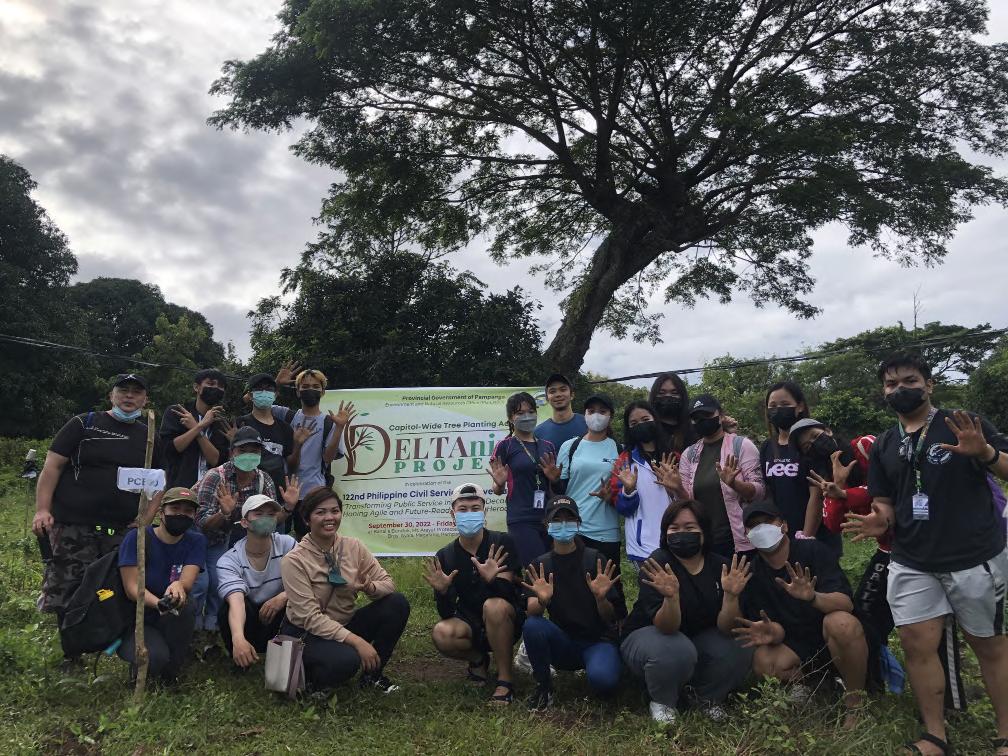
follow story on p.5
Participants were also required to bring their personal computers in addition to having internet access so that they can fully follow through with the training. However, problems were encountered such as not everyone having a device to use and poor internet connectivity within the venue, which is why the facilitators decided to just group the participants into six.
“Though some of us had problems with limited devices and internet connections, we were still able to manage to get through the training and workshop and were able to participate and present outputs,” said Angel Jhos Supan, one of the participants.
The workshop involved eminent resource persons including Science Research Specialist, Ms. Patricia Joy Cosio-Teopo, and Agricultural and Biosystems engineers Engr. Camille Joyce Martin, Engr. Casey Jane Cagatin, and Engr. Jezelle Salayon.
On the first day, topics discussed include Introduction of GIS and RS and its application to
Moreover, selected participants were asked to share their takeaways and experiences from the two-day workshop and training. According to Angel Jhos Supan, this was really an important opportunity for ABE students like him, especially after all they had been through for the past years of online learning.
“It was a beneficial experience lalo na’t magagamit namin ito sa aming future professions bilang AB engineers. And for me, the most valuable outcome of this event is getting together with fellow future engineers who have the same goals and vision as I do,” he added.
Delvin Nicole Esguerra and Jairo Miday, from BS ABE 4A and 4B, also described the similar encounter.
“At first, I was wondering what GIS means and how will it help me with the program I am taking, which is the BSABE. But this two-day seminar helped me to understand more and learn more about it. Camaraderie, teamwork and unity is what I discovered throughout the workshop. Special thanks to my group mates for participating in the activities given to us even though we had a hard time doing it. Aside from that, the whole seminar and workshop was awesome because of the happy people around me,” Delvin Nicole Esguerra shared.
“Doing seminars like this is very helpful lalong-lalo
After the certificates were awarded to participants, guest speakers, and facilitators, Engr. Melissa Olalia delivered a message of gratitude to all those who spent time, effort, and expertise on this activity. Engr. Olalia is the professor of the 4th-year ABE students in ABE 600 or Undergraduate Seminar, a course which requires ABE preprofessionals to attend and organize webinars or seminars related to their future field of work.
Engr. Laverne Olalia, an officer of the SRA-Luzon Agricultural Research and Extension Center in Florida, Pampanga, also delivered a message to the participants. He said that two days is barely enough for the conduct of seminar-workshops for softwares like GIS and RS, and SRA is open to those who want a higher level of knowledge in these softwares, with their AB engineers in the office available to further introduce this technology.
“Nonetheless, sana yung batch ninyo, yung school natin, ang PSAU, ay maging known sa paggamit natin nitong GIS… you can apply it sa thesis ninyo and also sa work,” he added.
Engr. Melissa Olalia and Engr. Laverne Olalia are graduates of Bachelor of Science in Agricultural Engineering from our university, Batch 2002. And Engr. Melissa has been part of the PSAU-ABE teaching staff for 20 years now, and according to her, this is the fourth time that the ABE department has held seminars on GIS and they are looking forward to continuing it for the next years.
Supan also mentioned the relevance of activity to the worsening climate change thus, tree planting and growing efforts save not just the environment but also the next generations.
Moreover, the Provincial Capitol and PGENRO also formally announced its collaboration with the institution regarding the implementation, observation, and sustentation of the project.
Meanwhile, PSAU-BioSoc also began its first stream bank rehabilitation led by project proponents — MS Biology students.
and an opening remark by Albert P. Bais from Municipal Environmental and Natural Resource Office of Magalang.
Further, NSTP students from CAS led the river clean-up drive before transporting the bamboo in the designated planting site along with the participants. After that, a seminar about bamboo livelihood was held inside the premises of the barangay hall through guest speaker, Sharmane Villanueva, a PSAU instructor.
continued from p.4
Accompanied by Dr. Rafael R. Rafael, PSAU’s Director for Planning and Project Development, the BioSoc officers, National Service Training Program-Citizens Welfare and Training Services (NSTP-CWTS) College of Arts and Sciences (CAS) section representatives, and MS Biology students went at San Roque, Magalang to plant bamboos along the river bank.
The activity began with a welcoming remark of Hon. June Marimla, barangay captain,
“Magandang umaattend sa ganitong mga activity para magkaroon ng meaning ang ating mga paghihirap sa pag-aaral [at] yung ating paghihirap sa paggawa ng researches kasi doon sa mga struggles [at] sa nga pagtitiyaga natin, ito yung [n]agiging impact natin,” Dr. Rafael stated after the seminar session.
Supan ended the activity by announcing the future activities of the society and encouraging students to continuously support the activities and projects.
PSAU-BioSoc joins Capitol’s tree planting; kicks off ‘Ilog aking Irog’ project
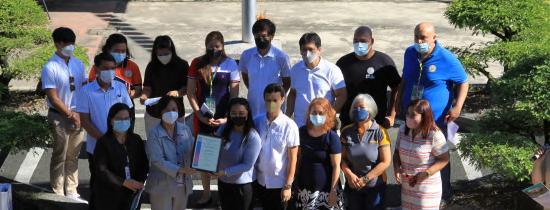
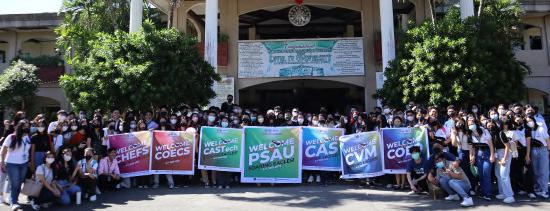
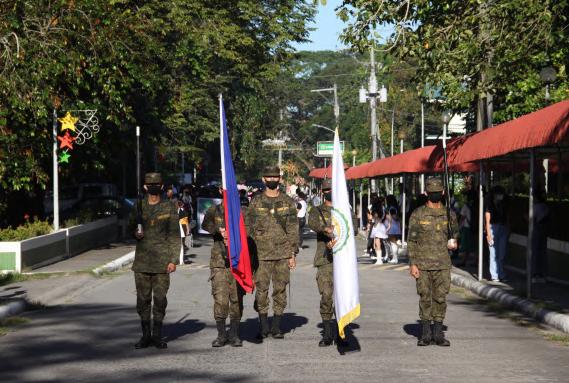
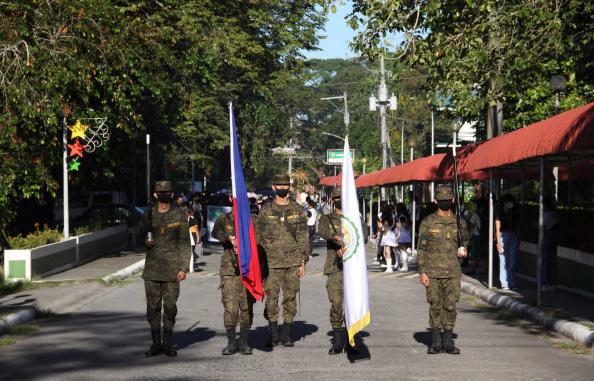 by Johanna Mae Maggay and John Andrey Susi
by Johanna Mae Maggay and John Andrey Susi
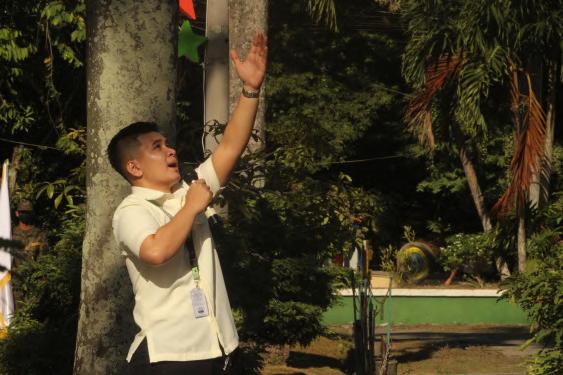
On Monday, November 7, 2022, the Pampanga State Agricultural University finally allowed additional students to participate in face-to-face classes after a wait of two years and eight months.
With this, the university welcomed everyone with a Grand Opening Salvo led by the PSAU Reserve Officers’ Training Corps (ROTC) unit, the PSAU Drum and Lyre Corps (PDLC), and the PSAU La Granja Modelo Dance Troupe (PSAU-LGMDT). The parade stretched from the San Agustin Bridge to within the campus, and finally held ground at the Administration Building where the flag rituals were conducted at exactly 8:22am with students and personnel as participants.
The ritual opened with an invocation ushered by the PSAU Imago Dei Chorale, who sang “The Lord Bless You and Keep You”, followed by the Salita ng Watawat delivered by Nathaniel Pamintuan, a 3rdyear BSEd Filipino student; then the singing of the National Anthem.
Subsequently, Sagot ng Mamayan and Panunumpa ng Watawat ng Pilipinas were led by John Kevin Meran and Sharmaine Rellama, 2ndyear BSEd Filipino students. Afterward, University OIC-President Dr. Lyndon Solis led the Panunumpa ng Kawani ng Gobyerno. Imno ning Kapampangan and PSAU Hymn were also sung by the Imago Dei Chorale with Mr. Renato Simbulan conducting, and accompanied by the PDLC. The floor was then given to Mr. Dexter Andrew Manalo, a CoEd professor, as the presenter.
During his opening remarks, Dr. Solis delivered a message of gratitude.
“We are all blessed, kasi nandito po tayong lahat. Parang ito po yung hudyat to open our second half face-to-face. Up to now, the administration is doing its best, makipag-ugnayan tayo sa ibang government agency. Mag-adjust po tayo, ang importante po ay nakabalik tayong lahat. At wala po kasing mas
maganda pa sa teaching and learning process kung hindi yung face-to-face. Kukunin natin yung maganda sa dalawa, yung online at face-to-face para mas maganda po yung transform of knowledge, ang iniisip po natin dito kayo po mga estudyante,” he stated, assuring that all students will bear the good effects of online classes as they return to the campus grounds.
Furthermore, Director II of the Civil Service Commission Pampanga Field Office, Ms. Emily Reyes, awarded the Certificate of Collective Agreement which pertains to the additional benefits to the PAC Faculty Union also known as the Collective Negotiation Agreement (CNA) incentives.
“The Civil Service Commission support constitutional rights of every government employee… It promotes public sector unionism as a mechanism to protect the welfare and interest of public sector employees and foster employee and employer relations. Usually po, when we hear the word CNA, it has the following word incentive. ‘Yun po ang pinakaimportante po na magkatulungan po ang management at employee association upang makapag-generate po ng saving,” Ms. Reyes said.
“We should not compromise quality. In the end, our main objective naman po is to produce quality students who will be the future leaders of this country,” she added.
In addition, Vice-President of Academic Affairs Dr. Anita David, expressed her appreciation to the Civil Service Commission and PSAU community.
“Thank you very much po sa lahat ng faculty, patuloy lang po tayong maglingkod sa gabay ng ating Panginoon. Ang vision po natin sa PSAU is to create a happy and healthy working environment, ‘cause we believe that we can be more productive if we are happy,” said Dr. David.
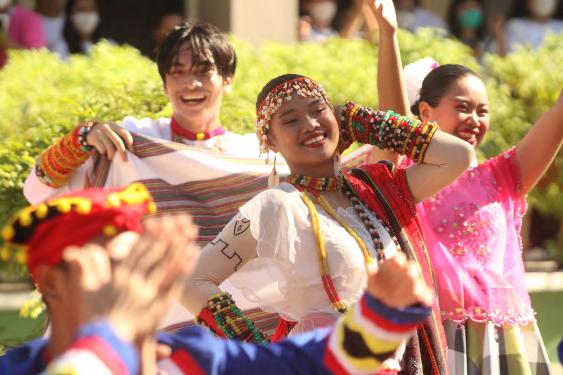
Following the speeches, the PSAU-LGMDT performed a lively and energetic dance performance in their respective categories such as folk dance,
indigenous dance, hip-hop, and contemporary dance, to the beat of “Sayaw Dabaw.”
The PSAU Live Band (otherwise known as “Pluma”) played music trends as a recessional part of the program. And the flag ceremony concluded at exactly 9:08am.
One of the members of PDLC Majorettes expressed her words regarding their preparation for Grand Opening Ceremony. “In general, lagi nilang sinasabi sa amin na be confident and enjoyin lang yung performance, yung discipline dapat nandyan at maging considerate sa iba mong kasama,” she stated.
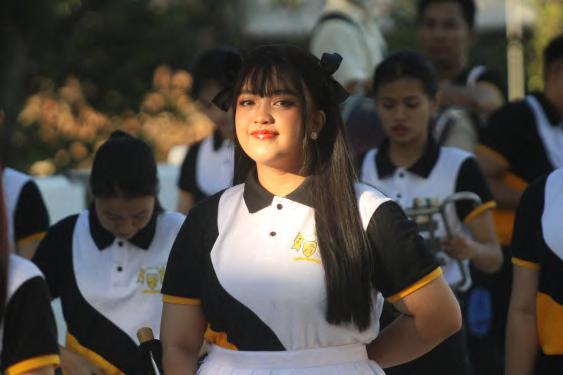
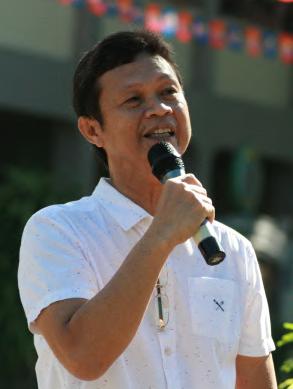
In line with this, a senior student who experienced face-to-face classes in his freshman year, Delvin Nicole Esguerra, gave insight on the second phase of face-to-face classes. “This first day of f2f classes, together with the lower years, made me the same smile when I first entered University. It was a nostalgic experience because after more than 2 years of having a virtual class, the school opened once again for a new chapter in the student’s life. Zoom classes now turn into physical interaction. The PSAU Hymn once again was heard with loud voices and people from the whole community gathered once again,” he said.
On the other hand, Justine Leyson, a 2ndyear student of Bachelor of Science in Agricultural and Biosystems Engineering, and a first-timer for face-to-face setup, shared his perspective on the resumption of in-campus classes. “The opening salvo burned off a chunk of my energy for the first day. But even with aching legs and searing heat, everything was worthwhile. I enjoyed watching the dance performances. I fondly listened and sang along with the live band. And I was being able to participate in the flag ceremony after a long time felt heartwarming and reminiscing. It is a delightful moment to remember,” he shared.
After two academic years without face-toface classes due to COVID-19, Pampanga State Agricultural University formally re-opened the school year 2022-2023 with currently 75% of enrolled students attending in-person classes.
According to Commission on Higher Education (CHED) Chairman J. Prospero De Vera, medical and allied courses that require laboratory, on-the-job training, and apprenticeship programs must primarily implement the traditional face-to-face classes. This initiated the first batch of students who resumed in-person classes last August 30, 2022.
However, with the recent push of CHED’s Memorandum Order (CMO) No. 16 stating that higher education institutions are compelled to conduct their degree programs through full faceto-face classes or hybrid learning, PSAU was urged to gradually carry out in-person classes. Thus, on November 7, 2022, the university commenced the extension to the second batch of students for this traditional mode of learning.
In an interview with Dr. Gerald Salas, co-chair of the Crisis Management Committee, there was a long preparation for the university’s reopening of in-person classes which started as early as 2021, first, through a survey to know the pulse of the school population toward faceto-face classes and a modified semester. After that, meetings were conducted with various offices to draft PSAU’s face-to-face guidelines in line with the CHED memorandum order.
Dr. Salas expressed the shared challenges observed within the committees at the university: “First, there was quite a struggle in choosing the programs na mauuna to conduct face-to-face learning, because of course, we want to give everyone a chance.” After much deliberation with the offices of the university, it was decided that the in-person classes be gradually implemented “for the primary reason na hindi mabigla lahat,” he added.
“We selected those programs and year levels that need to attend classes at the university. It was prioritized toward the higher year levels from third to the fourth year, and programs that have laboratory practicums, onthe-job training, and theses making,” Dr. Salas mentioned regarding the decision to organize the transition to in-person classes by batches and categories.
Another challenge faced was the classrooms. “Kinailangan mahilamusan ang mga classroom because they weren’t used for years,” Dr. Salas noted as he explained the homeroom basis dynamic of the students and teachers at
the university for now as a form of prevention method for illness transmission.
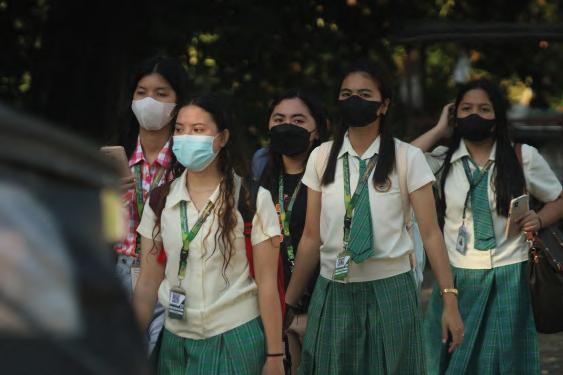
Overall, he concluded that the preparations conducted for PSAU’s resume of face-to-face classes were a collective effort of all the committees, stakeholders, and organizations within the school.
That said, the school body moved through its arrangements for face-to-face learning. Weeks before the opening of classes, students, led by the Supreme Students Council (SSC) and the various College Student Councils (CSCs), initiated their Brigada Iskwelas where they cleaned their college buildings and classrooms. In that same timeline, the PSAU administration and staff also conducted a prayer and peace walk around the campus last October 27, 2022.
As for one of the faculty members, Dr. Madelene Solis, the Dean of the College of Engineering and Computer Studies, said that there was not any drastic preparations regarding her teaching methods, however, she stated, “’Yung preparation sa classroom medyo may difference because we have to follow the health protocols like social distancing, wearing of a mask, and the way we talk with our students iba rin.”
From a student’s view, Desiree Arcega, a working student from the Department of Geodetic Engineering, expressed her preparation for in-person learning. She said that she had to deliberately plan her schedules both at work and at school. “One of my biggest concerns is the time I’d be consuming to prepare for school and work, also noting the budgeting of my allowance for the face-to-face classes,” she added.
Upon several discussions within the school committees, PSAU’s limited face-to-face classes were systematized into three categories: The modality learning for the Category 1 is limited face-to-face and asynchronous classes. Category 2 is synchronous and asynchronous online class. Category 3, consists of a synchronous and asynchronous online class and limited face-to-face assessment.
In conjunction with the first batch of inperson classes, the university opened its gates to a few degree programs including the 2nd Year to 4th Year students of BS Geodetic Engineering and BS Biology, 3rd Year to 4th Year students of BS Agricultural & Biosystems Engineering and BS Agriculture, 3rd Year students of BS Food Technology and Bachelor of Physical Education. It also includes the 5th Year and 6th Year
students of the College of Veterinary Medicines. The official guidelines for the first batch were announced last August 22, 2022.
In line with the expansion of limited face-toface classes in the second half of the first semester, the PSAU announced last October 18, 2022, to include more courses to conduct the in-person classes. These courses are the 2nd Year to 4th Year students of BS Hospitality Management, BS Food Technology, BS Geodetic Engineering, BS Agricultural and Biosystems Engineering, BS Biology, BA English Language Studies, and BS Mathematics, 3rd Year to 4th Year students of BS Information Technology, BS Agriculture, BS Fisheries, BS Agroforestry, BS Forestry, BS Agricultural Business, BS Agricultural Economics, BS Development Communication, and BS Entrepreneurship, 2nd Year and 3rd Year students of Bachelor of Elementary Education, Bachelor of Secondary Education, Bachelor of Physical Education, and Bachelor of Technology and Livelihood Education, 2nd Year to 6th Year Students of College of Veterinary Medicine, and 2nd Year students of BS Civil Engineering and BS Computer Engineering.
Aside from the dissemination of students per category, there were other imposed guidelines from the school administration.
Students attending face-to-face classes are mandated to present the student QR Code upon entry and exit on campus. For the health and safety of the university population, everyone is encouraged to follow the health protocols by still wearing face masks, observing social distancing, and heeding proper hygiene. In addition, regardless of vaccination status, they are encouraged to bring vaccination cards for those vaccinated students.
For the school uniform, the students from higher levels such as 3rd year and 4th year are urged to wear proper school uniforms if they have any. However, for those who do not have, the university warned the students to follow the proper dress code. Moreover, all students must wear their school uniform in January 2023.
Other specific guidelines like university dormitories, vehicle passes, students’ room designations, and class schedules were also announced.
There were radical changes within the education system brought about by the pandemic, and that particularly included the rushed shift from traditional learning to distance learning. Now, the clamor and longing of students and teachers for the resumption of face-to-face education are satisfied since the announcement of opening classes. However, this also sheds light on another transition
that has to be made yet again.
Aligned with that, two of the popular places on campus that are constantly buzzing with students are the PSAU Library and Furthermore, Estrelita Cruz, a member from the UFC, said that the transition from online to in-person classes did not really affect the function of the UFC since it was always open even before the students surged in. She explained that “Parang pareho lang ‘yung sa’min bilang may mga stall na naglabasan, pareho rin nung kung ano yung dati [na online] yung mga estudyante, tapos ngayong face-to-face.”
In the perception of faculty member Engr. Russel John Clarete, an instructor from the Department of Geodetic Engineering, the transition was fine since it was already initiated in the 1st half of the semester. “Of course, all of us might experience culture shock since I started my first years of teaching in an online setup. But enjoyed the most because I could conduct laboratory [practicums], and the examinations and quizzes are well supervised unlike in online class,” Engr. Clarete elaborated.
There were also insights from PSAU students now attending face-to-face classes. Ronna May Gonzales, a student from the Bachelor of Arts in English Language Studies program, remarked that “Sobrang nanibago ako from online class to face-to-face kasi nasanay ako through virtual lang, and then ‘yung classmates ko din first time ko na-meet so sobrang iba pala ‘yung feeling kapag nakikita mo sila in person and not only in screen talaga. But in-person learning is a good set up dahil nakakapag-interact kami through discussions and ‘yung mga activities nagagawa na namin ng maayos.”
Another input was made by Sharyl Sanchez, a student from the Bachelor of Secondary Education Major in English, who said that as a student who studies away from home for the face-to-face classes, her transition so far is torn between stressful and exciting. “Stressful that I have to pack my clothes, cabinets, appliances, and many more that could bring with me during the face to face classes and given the fact that the resumption was short notice. Exciting that finally after two years of distant learning, I’m able to see and hear my classmates and professors without any inconvenience, such as lag and inaudible sounds,” she added.
At present, with the recent declaration from CHED to fully revert to the traditional mode of education by the second semester, there is yet to be an official statement from the PSAU administration.
